SRC/draw.c File Reference
#include <stdio.h>#include <string.h>#include <math.h>#include "util.h"#include "vpr_types.h"#include "vpr_utils.h"#include "globals.h"#include "graphics.h"#include "path_delay.h"#include "draw.h"#include <assert.h>
Go to the source code of this file.
Defines | |
| #define | MAX_BLOCK_COLOURS 5 |
Enumerations | |
| enum | e_draw_rr_toggle { DRAW_NO_RR = 0, DRAW_ALL_RR, DRAW_ALL_BUT_BUFFERS_RR, DRAW_NODES_AND_SBOX_RR, DRAW_NODES_RR, DRAW_RR_TOGGLE_MAX } |
| enum | e_draw_net_type { ALL_NETS, HIGHLIGHTED } |
| enum | e_edge_dir { FROM_X_TO_Y, FROM_Y_TO_X } |
Functions | |
| static enum color_types *static block_color void | toggle_nets (void(*drawscreen)(void)) |
| static void | toggle_rr (void(*drawscreen)(void)) |
| static void | toggle_congestion (void(*drawscreen)(void)) |
| static void | highlight_crit_path (void(*drawscreen_ptr)(void)) |
| static void | drawscreen (void) |
| static void | redraw_screen (void) |
| static void | drawplace (void) |
| static void | drawnets (void) |
| static void | drawroute (enum e_draw_net_type draw_net_type) |
| static void | draw_congestion (void) |
| static void | highlight_blocks (float x, float y) |
| static void | get_block_center (int bnum, float *x, float *y) |
| static void | deselect_all (void) |
| static void | draw_rr (void) |
| static void | draw_rr_edges (int from_node) |
| static void | draw_rr_pin (int inode, enum color_types color) |
| static void | draw_rr_chanx (int inode, int itrack) |
| static void | draw_rr_chany (int inode, int itrack) |
| static void | get_rr_pin_draw_coords (int inode, int iside, int ioff, float *xcen, float *ycen) |
| static void | draw_pin_to_chan_edge (int pin_node, int chan_node) |
| static void | draw_x (float x, float y, float size) |
| static void | draw_chany_to_chany_edge (int from_node, int from_track, int to_node, int to_track, short switch_type) |
| static void | draw_chanx_to_chanx_edge (int from_node, int from_track, int to_node, int to_track, short switch_type) |
| static void | draw_chanx_to_chany_edge (int chanx_node, int chanx_track, int chany_node, int chany_track, enum e_edge_dir edge_dir, short switch_type) |
| static int | get_track_num (int inode, int **chanx_track, int **chany_track) |
| static void | draw_rr_switch (float from_x, float from_y, float to_x, float to_y, boolean buffered) |
| static void | draw_triangle_along_line (float xend, float yend, float x1, float x2, float y1, float y2) |
| void | set_graphics_state (boolean show_graphics_val, int gr_automode_val, enum e_route_type route_type) |
| void | update_screen (int priority, char *msg, enum pic_type pic_on_screen_val, boolean crit_path_button_enabled) |
| void | alloc_draw_structs (void) |
| void | init_draw_coords (float width_val) |
Variables | |
| static boolean | show_nets = FALSE |
| static enum e_draw_rr_toggle | draw_rr_toggle = DRAW_NO_RR |
| static enum e_route_type | draw_route_type |
| static boolean | show_congestion = FALSE |
| static boolean | show_graphics |
| static char | default_message [BUFSIZE] |
| static int | gr_automode |
| static enum pic_type | pic_on_screen = NO_PICTURE |
| static float * | tile_x |
| static float * | tile_y |
| static float | tile_width |
| static float | pin_size |
Define Documentation
Enumeration Type Documentation
| enum e_draw_net_type |
Definition at line 26 of file draw.c.
00027 { ALL_NETS, HIGHLIGHTED };
| enum e_draw_rr_toggle |
- Enumerator:
DRAW_NO_RR DRAW_ALL_RR DRAW_ALL_BUT_BUFFERS_RR DRAW_NODES_AND_SBOX_RR DRAW_NODES_RR DRAW_RR_TOGGLE_MAX
Definition at line 16 of file draw.c.
00017 { 00018 DRAW_NO_RR = 0, 00019 DRAW_ALL_RR, 00020 DRAW_ALL_BUT_BUFFERS_RR, 00021 DRAW_NODES_AND_SBOX_RR, 00022 DRAW_NODES_RR, 00023 DRAW_RR_TOGGLE_MAX 00024 };
| enum e_edge_dir |
Definition at line 29 of file draw.c.
00030 { FROM_X_TO_Y, FROM_Y_TO_X }; /* Chanx to chany or vice versa? */
Function Documentation
| void alloc_draw_structs | ( | void | ) |
Definition at line 455 of file draw.c.
00456 { 00457 00458 /* Allocate the structures needed to draw the placement and routing. Set * 00459 * up the default colors for blocks and nets. */ 00460 00461 tile_x = (float *)my_malloc((nx + 2) * sizeof(float)); 00462 tile_y = (float *)my_malloc((ny + 2) * sizeof(float)); 00463 00464 net_color = (enum color_types *) 00465 my_malloc(num_nets * sizeof(enum color_types)); 00466 00467 block_color = (enum color_types *) 00468 my_malloc(num_blocks * sizeof(enum color_types)); 00469 00470 deselect_all(); /* Set initial colors */ 00471 }


| static void deselect_all | ( | void | ) | [static] |
Definition at line 1940 of file draw.c.
01941 { 01942 /* Sets the color of all clbs and nets to the default. */ 01943 01944 int i; 01945 01946 /* Create some colour highlighting */ 01947 for(i = 0; i < num_blocks; i++) { 01948 if(block[i].type->index < 3) { 01949 block_color[i] = LIGHTGREY; 01950 } else if(block[i].type->index < 3 + MAX_BLOCK_COLOURS) { 01951 block_color[i] = BISQUE + MAX_BLOCK_COLOURS + block[i].type->index - 3; 01952 } else { 01953 block_color[i] = BISQUE + 2 * MAX_BLOCK_COLOURS - 1; 01954 } 01955 } 01956 01957 for(i = 0; i < num_nets; i++) 01958 net_color[i] = BLACK; 01959 }

| static void draw_chanx_to_chanx_edge | ( | int | from_node, | |
| int | from_track, | |||
| int | to_node, | |||
| int | to_track, | |||
| short | switch_type | |||
| ) | [static] |
Definition at line 1208 of file draw.c.
01213 { 01214 01215 /* Draws a connection between two x-channel segments. Passing in the track * 01216 * numbers allows this routine to be used for both rr_graph and routing * 01217 * drawing. */ 01218 01219 float x1, x2, y1, y2; 01220 int from_y, to_y, from_xlow, to_xlow, from_xhigh, to_xhigh; 01221 01222 from_y = rr_node[from_node].ylow; 01223 from_xlow = rr_node[from_node].xlow; 01224 from_xhigh = rr_node[from_node].xhigh; 01225 to_y = rr_node[to_node].ylow; 01226 to_xlow = rr_node[to_node].xlow; 01227 to_xhigh = rr_node[to_node].xhigh; 01228 01229 /* (x1, y1) point on from_node, (x2, y2) point on to_node. */ 01230 01231 y1 = tile_y[from_y] + tile_width + 1 + from_track; 01232 y2 = tile_y[to_y] + tile_width + 1 + to_track; 01233 01234 01235 if(to_xhigh < from_xlow) 01236 { /* From right to left */ 01237 /* UDSD Note by WMF: could never happen for INC wires, unless U-turn. For DEC 01238 * wires this handles well */ 01239 x1 = tile_x[from_xlow]; 01240 x2 = tile_x[to_xhigh] + tile_width; 01241 } 01242 else if(to_xlow > from_xhigh) 01243 { /* From left to right */ 01244 /* UDSD Note by WMF: could never happen for DEC wires, unless U-turn. For INC 01245 * wires this handles well */ 01246 x1 = tile_x[from_xhigh] + tile_width; 01247 x2 = tile_x[to_xlow]; 01248 } 01249 01250 /* Segments overlap in the channel. Figure out best way to draw. Have to * 01251 * make sure the drawing is symmetric in the from rr and to rr so the edges * 01252 * will be drawn on top of each other for bidirectional connections. */ 01253 01254 /* UDSD Modification by WMF Begin */ 01255 else 01256 { 01257 if(rr_node[to_node].direction != BI_DIRECTION) 01258 { 01259 /* must connect to to_node's wire beginning at x2 */ 01260 if(to_track % 2 == 0) 01261 { /* INC wire starts at leftmost edge */ 01262 assert(from_xlow < to_xlow); 01263 x2 = tile_x[to_xlow]; 01264 /* since no U-turns from_track must be INC as well */ 01265 x1 = tile_x[to_xlow - 1] + tile_width; 01266 } 01267 else 01268 { /* DEC wire starts at rightmost edge */ 01269 assert(from_xhigh > to_xhigh); 01270 x2 = tile_x[to_xhigh] + tile_width; 01271 x1 = tile_x[to_xhigh + 1]; 01272 } 01273 } 01274 else 01275 { 01276 if(to_xlow < from_xlow) 01277 { /* Draw from left edge of one to other */ 01278 x1 = tile_x[from_xlow]; 01279 x2 = tile_x[from_xlow - 1] + tile_width; 01280 } 01281 else if(from_xlow < to_xlow) 01282 { 01283 x1 = tile_x[to_xlow - 1] + tile_width; 01284 x2 = tile_x[to_xlow]; 01285 } /* The following then is executed when from_xlow == to_xlow */ 01286 else if(to_xhigh > from_xhigh) 01287 { /* Draw from right edge of one to other */ 01288 x1 = tile_x[from_xhigh] + tile_width; 01289 x2 = tile_x[from_xhigh + 1]; 01290 } 01291 else if(from_xhigh > to_xhigh) 01292 { 01293 x1 = tile_x[to_xhigh + 1]; 01294 x2 = tile_x[to_xhigh] + tile_width; 01295 } 01296 else 01297 { /* Complete overlap: start and end both align. Draw outside the sbox */ 01298 x1 = tile_x[from_xlow]; 01299 x2 = tile_x[from_xlow] + tile_width; 01300 } 01301 } 01302 } 01303 /* UDSD Modification by WMF End */ 01304 drawline(x1, y1, x2, y2); 01305 01306 if(draw_rr_toggle == DRAW_ALL_RR) 01307 draw_rr_switch(x1, y1, x2, y2, switch_inf[switch_type].buffered); 01308 }

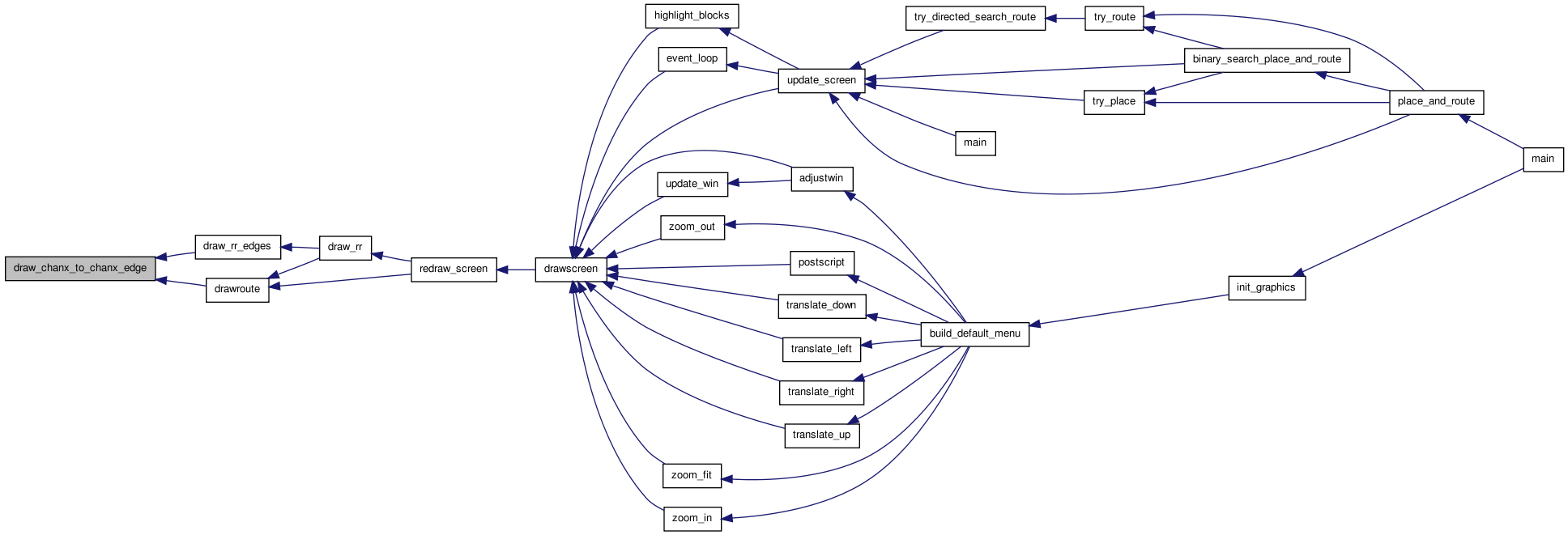
| static void draw_chanx_to_chany_edge | ( | int | chanx_node, | |
| int | chanx_track, | |||
| int | chany_node, | |||
| int | chany_track, | |||
| enum e_edge_dir | edge_dir, | |||
| short | switch_type | |||
| ) | [static] |
Definition at line 1129 of file draw.c.
01135 { 01136 01137 /* Draws an edge (SBOX connection) between an x-directed channel and a * 01138 * y-directed channel. */ 01139 01140 float x1, y1, x2, y2; 01141 int chanx_y, chany_x, chanx_xlow, chany_ylow; 01142 01143 chanx_y = rr_node[chanx_node].ylow; 01144 chanx_xlow = rr_node[chanx_node].xlow; 01145 chany_x = rr_node[chany_node].xlow; 01146 chany_ylow = rr_node[chany_node].ylow; 01147 01148 /* (x1,y1): point on CHANX segment, (x2,y2): point on CHANY segment. */ 01149 01150 y1 = tile_y[chanx_y] + tile_width + 1. + chanx_track; 01151 x2 = tile_x[chany_x] + tile_width + 1. + chany_track; 01152 01153 if(chanx_xlow <= chany_x) 01154 { /* Can draw connection going right */ 01155 x1 = tile_x[chany_x] + tile_width; 01156 /* UDSD by AY Start */ 01157 if(rr_node[chanx_node].direction != BI_DIRECTION) 01158 { 01159 if(edge_dir == FROM_X_TO_Y) 01160 { 01161 if((chanx_track % 2) == 1) 01162 { /* UDSD Modifications by WMF: If dec wire, then going left */ 01163 x1 = tile_x[chany_x + 1]; 01164 } 01165 } 01166 } 01167 /* UDSD by AY End */ 01168 } 01169 else 01170 { /* Must draw connection going left. */ 01171 x1 = tile_x[chanx_xlow]; 01172 } 01173 01174 if(chany_ylow <= chanx_y) 01175 { /* Can draw connection going up. */ 01176 y2 = tile_y[chanx_y] + tile_width; 01177 /* UDSD by AY Start */ 01178 if(rr_node[chany_node].direction != BI_DIRECTION) 01179 { 01180 if(edge_dir == FROM_Y_TO_X) 01181 { 01182 if((chany_track % 2) == 1) 01183 { /* UDSD Modifications by WMF: If dec wire, then going down */ 01184 y2 = tile_y[chanx_y + 1]; 01185 } 01186 } 01187 } 01188 /* UDSD by AY End */ 01189 } 01190 else 01191 { /* Must draw connection going down. */ 01192 y2 = tile_y[chany_ylow]; 01193 } 01194 01195 drawline(x1, y1, x2, y2); 01196 01197 if(draw_rr_toggle != DRAW_ALL_RR) 01198 return; 01199 01200 if(edge_dir == FROM_X_TO_Y) 01201 draw_rr_switch(x1, y1, x2, y2, switch_inf[switch_type].buffered); 01202 else 01203 draw_rr_switch(x2, y2, x1, y1, switch_inf[switch_type].buffered); 01204 }

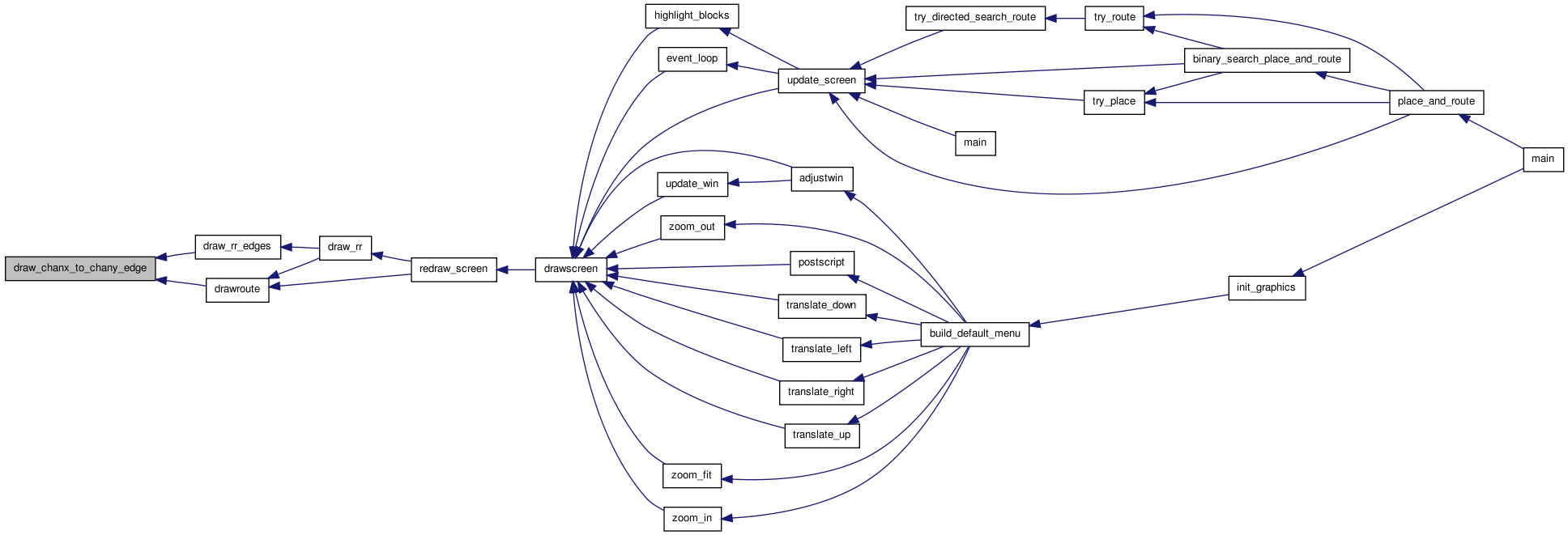
| static void draw_chany_to_chany_edge | ( | int | from_node, | |
| int | from_track, | |||
| int | to_node, | |||
| int | to_track, | |||
| short | switch_type | |||
| ) | [static] |
Definition at line 1312 of file draw.c.
01317 { 01318 01319 /* Draws a connection between two y-channel segments. Passing in the track * 01320 * numbers allows this routine to be used for both rr_graph and routing * 01321 * drawing. */ 01322 01323 float x1, x2, y1, y2; 01324 int from_x, to_x, from_ylow, to_ylow, from_yhigh, to_yhigh; 01325 01326 from_x = rr_node[from_node].xlow; 01327 from_ylow = rr_node[from_node].ylow; 01328 from_yhigh = rr_node[from_node].yhigh; 01329 to_x = rr_node[to_node].xlow; 01330 to_ylow = rr_node[to_node].ylow; 01331 to_yhigh = rr_node[to_node].yhigh; 01332 01333 /* (x1, y1) point on from_node, (x2, y2) point on to_node. */ 01334 01335 x1 = tile_x[from_x] + tile_width + 1 + from_track; 01336 x2 = tile_x[to_x] + tile_width + 1 + to_track; 01337 01338 if(to_yhigh < from_ylow) 01339 { /* From upper to lower */ 01340 y1 = tile_y[from_ylow]; 01341 y2 = tile_y[to_yhigh] + tile_width; 01342 } 01343 else if(to_ylow > from_yhigh) 01344 { /* From lower to upper */ 01345 y1 = tile_y[from_yhigh] + tile_width; 01346 y2 = tile_y[to_ylow]; 01347 } 01348 01349 /* Segments overlap in the channel. Figure out best way to draw. Have to * 01350 * make sure the drawing is symmetric in the from rr and to rr so the edges * 01351 * will be drawn on top of each other for bidirectional connections. */ 01352 01353 /* UDSD Modification by WMF Begin */ 01354 else 01355 { 01356 if(rr_node[to_node].direction != BI_DIRECTION) 01357 { 01358 if(to_track % 2 == 0) 01359 { /* INC wire starts at bottom edge */ 01360 assert(from_ylow < to_ylow); 01361 y2 = tile_y[to_ylow]; 01362 /* since no U-turns from_track must be INC as well */ 01363 y1 = tile_y[to_ylow - 1] + tile_width; 01364 } 01365 else 01366 { /* DEC wire starts at top edge */ 01367 if(!(from_yhigh > to_yhigh)) 01368 { 01369 printf 01370 ("from_yhigh (%d) !> to_yhigh (%d).\n", 01371 from_yhigh, to_yhigh); 01372 printf 01373 ("from is (%d, %d) to (%d, %d) track %d.\n", 01374 rr_node[from_node].xhigh, 01375 rr_node[from_node].yhigh, 01376 rr_node[from_node].xlow, 01377 rr_node[from_node].ylow, 01378 rr_node[from_node].ptc_num); 01379 printf 01380 ("to is (%d, %d) to (%d, %d) track %d.\n", 01381 rr_node[to_node].xhigh, 01382 rr_node[to_node].yhigh, 01383 rr_node[to_node].xlow, 01384 rr_node[to_node].ylow, 01385 rr_node[to_node].ptc_num); 01386 exit(1); 01387 } 01388 y2 = tile_y[to_yhigh] + tile_width; 01389 y1 = tile_y[to_yhigh + 1]; 01390 } 01391 } 01392 else 01393 { 01394 if(to_ylow < from_ylow) 01395 { /* Draw from bottom edge of one to other. */ 01396 y1 = tile_y[from_ylow]; 01397 y2 = tile_y[from_ylow - 1] + tile_width; 01398 } 01399 else if(from_ylow < to_ylow) 01400 { 01401 y1 = tile_y[to_ylow - 1] + tile_width; 01402 y2 = tile_y[to_ylow]; 01403 } 01404 else if(to_yhigh > from_yhigh) 01405 { /* Draw from top edge of one to other. */ 01406 y1 = tile_y[from_yhigh] + tile_width; 01407 y2 = tile_y[from_yhigh + 1]; 01408 } 01409 else if(from_yhigh > to_yhigh) 01410 { 01411 y1 = tile_y[to_yhigh + 1]; 01412 y2 = tile_y[to_yhigh] + tile_width; 01413 } 01414 else 01415 { /* Complete overlap: start and end both align. Draw outside the sbox */ 01416 y1 = tile_y[from_ylow]; 01417 y2 = tile_y[from_ylow] + tile_width; 01418 } 01419 } 01420 } 01421 /* UDSD Modification by WMF End */ 01422 drawline(x1, y1, x2, y2); 01423 01424 if(draw_rr_toggle == DRAW_ALL_RR) 01425 draw_rr_switch(x1, y1, x2, y2, switch_inf[switch_type].buffered); 01426 }

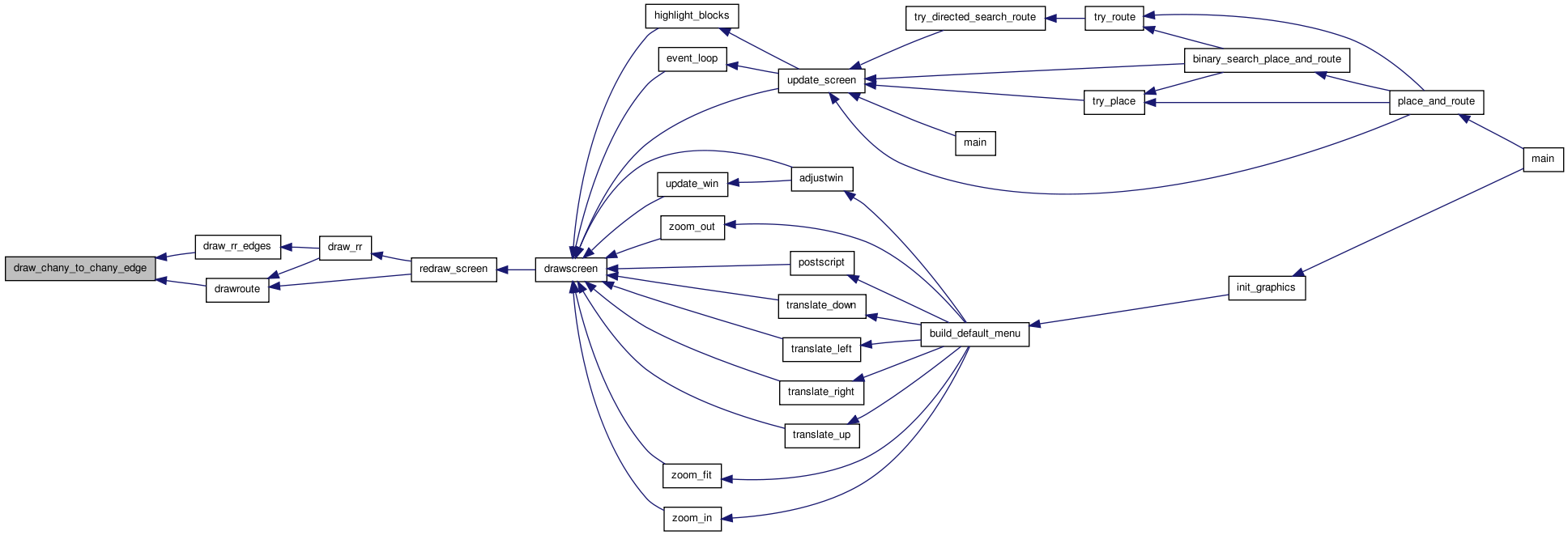
| static void draw_congestion | ( | void | ) | [static] |
Definition at line 715 of file draw.c.
00716 { 00717 00718 /* Draws all the overused routing resources (i.e. congestion) in RED. */ 00719 00720 int inode, itrack; 00721 00722 setcolor(RED); 00723 setlinewidth(2); 00724 00725 for(inode = 0; inode < num_rr_nodes; inode++) 00726 { 00727 if(rr_node[inode].occ > rr_node[inode].capacity) 00728 { 00729 switch (rr_node[inode].type) 00730 { 00731 case CHANX: 00732 itrack = rr_node[inode].ptc_num; 00733 draw_rr_chanx(inode, itrack); 00734 break; 00735 00736 case CHANY: 00737 itrack = rr_node[inode].ptc_num; 00738 draw_rr_chany(inode, itrack); 00739 break; 00740 00741 case IPIN: 00742 case OPIN: 00743 draw_rr_pin(inode, RED); 00744 break; 00745 } 00746 } 00747 } 00748 }
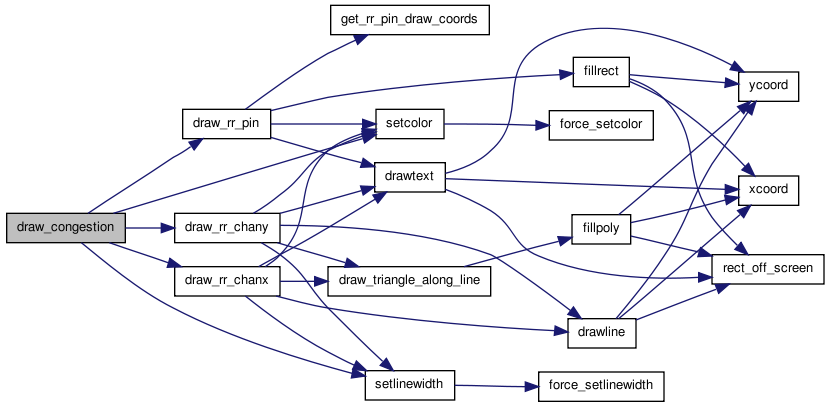
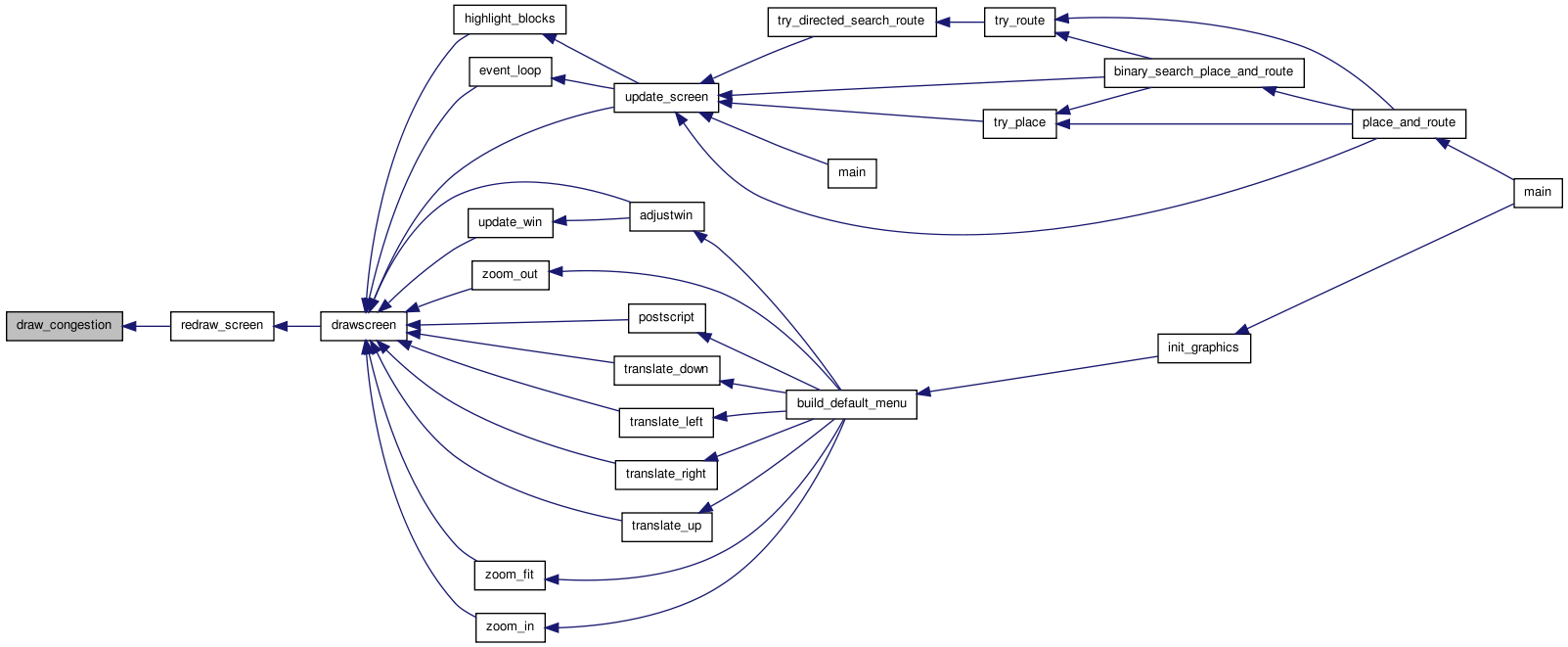
| static void draw_pin_to_chan_edge | ( | int | pin_node, | |
| int | chan_node | |||
| ) | [static] |
Definition at line 1998 of file draw.c.
02000 { 02001 02002 /* This routine draws an edge from the pin_node to the chan_node (CHANX or * 02003 * CHANY). The connection is made to the nearest end of the track instead * 02004 * of perpundicular to the track to symbolize a single-drive connection. * 02005 * If mark_conn is TRUE, draw a box where the pin connects to the track * 02006 * (useful for drawing the rr graph) */ 02007 02008 /* TODO: Fix this for global routing, currently for detailed only */ 02009 02010 t_rr_type chan_type; 02011 int grid_x, grid_y, pin_num, chan_xlow, chan_ylow, ioff, height; 02012 float x1, x2, y1, y2; 02013 int start, end, i; 02014 int itrack; 02015 float xend, yend; 02016 float draw_pin_off; 02017 enum e_direction direction; 02018 enum e_side iside; 02019 t_type_ptr type; 02020 02021 direction = rr_node[chan_node].direction; 02022 grid_x = rr_node[pin_node].xlow; 02023 grid_y = rr_node[pin_node].ylow; 02024 pin_num = rr_node[pin_node].ptc_num; 02025 chan_type = rr_node[chan_node].type; 02026 itrack = rr_node[chan_node].ptc_num; 02027 type = grid[grid_x][grid_y].type; 02028 02029 ioff = grid[grid_x][grid_y].offset; 02030 /* large block begins at primary tile (offset == 0) */ 02031 grid_y = grid_y - ioff; 02032 height = grid[grid_x][grid_y].type->height; 02033 chan_ylow = rr_node[chan_node].ylow; 02034 chan_xlow = rr_node[chan_node].xlow; 02035 start = -1; 02036 end = -1; 02037 02038 02039 switch (chan_type) 02040 { 02041 02042 case CHANX: 02043 start = rr_node[chan_node].xlow; 02044 end = rr_node[chan_node].xhigh; 02045 if(is_opin(pin_num, type)) 02046 { 02047 if(direction == INC_DIRECTION) 02048 { 02049 end = rr_node[chan_node].xlow; 02050 } 02051 else if(direction == DEC_DIRECTION) 02052 { 02053 start = rr_node[chan_node].xhigh; 02054 } 02055 } 02056 02057 start = max(start, grid_x); 02058 end = min(end, grid_x); /* Width is 1 always */ 02059 assert(end >= start); /* Make sure we are nearby */ 02060 02061 if((grid_y + height - 1) == chan_ylow) 02062 { 02063 iside = TOP; 02064 ioff = height - 1; 02065 draw_pin_off = pin_size; 02066 } 02067 else 02068 { 02069 assert((grid_y - 1) == chan_ylow); 02070 02071 iside = BOTTOM; 02072 ioff = 0; 02073 draw_pin_off = -pin_size; 02074 } 02075 assert(grid[grid_x][grid_y].type->pinloc[ioff][iside][pin_num]); 02076 02077 get_rr_pin_draw_coords(pin_node, iside, ioff, &x1, &y1); 02078 y1 += draw_pin_off; 02079 02080 y2 = tile_y[rr_node[chan_node].ylow] + tile_width + 1. + itrack; 02081 x2 = x1; 02082 if(is_opin(pin_num, type)) 02083 { 02084 if(direction == INC_DIRECTION) 02085 { 02086 x2 = tile_x[rr_node[chan_node].xlow]; 02087 } 02088 else if(direction == DEC_DIRECTION) 02089 { 02090 x2 = tile_x[rr_node[chan_node].xhigh] + 02091 tile_width; 02092 } 02093 } 02094 break; 02095 02096 case CHANY: 02097 start = rr_node[chan_node].ylow; 02098 end = rr_node[chan_node].yhigh; 02099 if(is_opin(pin_num, type)) 02100 { 02101 if(direction == INC_DIRECTION) 02102 { 02103 end = rr_node[chan_node].ylow; 02104 } 02105 else if(direction == DEC_DIRECTION) 02106 { 02107 start = rr_node[chan_node].yhigh; 02108 } 02109 } 02110 02111 start = max(start, grid_y); 02112 end = min(end, (grid_y + height - 1)); /* Width is 1 always */ 02113 assert(end >= start); /* Make sure we are nearby */ 02114 02115 if((grid_x) == chan_xlow) 02116 { 02117 iside = RIGHT; 02118 draw_pin_off = pin_size; 02119 } 02120 else 02121 { 02122 assert((grid_x - 1) == chan_xlow); 02123 iside = LEFT; 02124 draw_pin_off = -pin_size; 02125 } 02126 for(i = start; i <= end; i++) 02127 { 02128 ioff = i - grid_y; 02129 assert(ioff >= 0 && ioff < type->height); 02130 /* Once we find the location, break out, this will leave ioff pointing 02131 * to the correct offset. If an offset is not found, the assertion after 02132 * this will fail. With the correct routing graph, the assertion will not 02133 * be triggered. This also takes care of connecting a wire once to multiple 02134 * physical pins on the same side. */ 02135 if(grid[grid_x][grid_y].type-> 02136 pinloc[ioff][iside][pin_num]) 02137 { 02138 break; 02139 } 02140 } 02141 assert(grid[grid_x][grid_y].type->pinloc[ioff][iside][pin_num]); 02142 02143 get_rr_pin_draw_coords(pin_node, iside, ioff, &x1, &y1); 02144 x1 += draw_pin_off; 02145 02146 x2 = tile_x[chan_xlow] + tile_width + 1 + itrack; 02147 y2 = y1; 02148 if(is_opin(pin_num, type)) 02149 { 02150 if(direction == INC_DIRECTION) 02151 { 02152 y2 = tile_y[rr_node[chan_node].ylow]; 02153 } 02154 else if(direction == DEC_DIRECTION) 02155 { 02156 y2 = tile_y[rr_node[chan_node].yhigh] + 02157 tile_width; 02158 } 02159 } 02160 break; 02161 02162 default: 02163 printf 02164 ("Error in draw_pin_to_chan_edge: invalid channel node %d.\n", 02165 chan_node); 02166 exit(1); 02167 } 02168 02169 drawline(x1, y1, x2, y2); 02170 if(direction == BI_DIRECTION || !is_opin(pin_num, type)) 02171 { 02172 draw_x(x2, y2, 0.7 * pin_size); 02173 } 02174 else 02175 { 02176 xend = x2 + (x1 - x2) / 10.; 02177 yend = y2 + (y1 - y2) / 10.; 02178 draw_triangle_along_line(xend, yend, x1, x2, y1, y2); 02179 } 02180 }
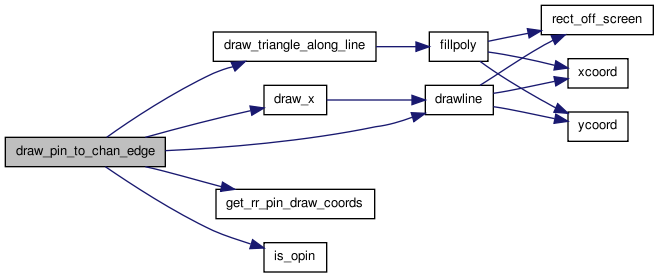
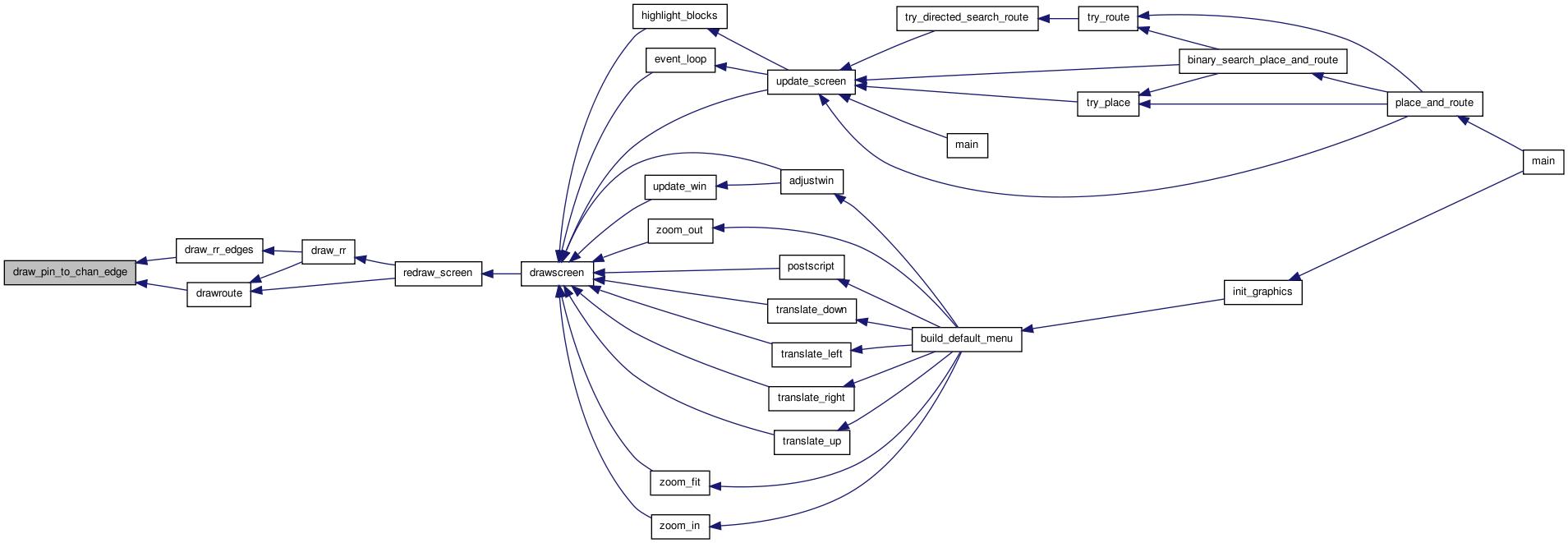
| void draw_rr | ( | void | ) | [static] |
Definition at line 752 of file draw.c.
00753 { 00754 00755 /* Draws the routing resources that exist in the FPGA, if the user wants * 00756 * them drawn. */ 00757 00758 int inode, itrack; 00759 00760 if(draw_rr_toggle == DRAW_NO_RR) 00761 { 00762 setlinewidth(3); 00763 drawroute(HIGHLIGHTED); 00764 setlinewidth(0); 00765 return; 00766 } 00767 00768 setlinestyle(SOLID); 00769 setlinewidth(0); 00770 00771 for(inode = 0; inode < num_rr_nodes; inode++) 00772 { 00773 switch (rr_node[inode].type) 00774 { 00775 00776 case SOURCE: 00777 case SINK: 00778 break; /* Don't draw. */ 00779 00780 case CHANX: 00781 setcolor(BLACK); 00782 itrack = rr_node[inode].ptc_num; 00783 draw_rr_chanx(inode, itrack); 00784 draw_rr_edges(inode); 00785 break; 00786 00787 case CHANY: 00788 setcolor(BLACK); 00789 itrack = rr_node[inode].ptc_num; 00790 draw_rr_chany(inode, itrack); 00791 draw_rr_edges(inode); 00792 break; 00793 00794 case IPIN: 00795 draw_rr_pin(inode, BLUE); 00796 break; 00797 00798 case OPIN: 00799 draw_rr_pin(inode, RED); 00800 setcolor(RED); 00801 draw_rr_edges(inode); 00802 break; 00803 00804 default: 00805 printf 00806 ("Error in draw_rr: Unexpected rr_node type: %d.\n", 00807 rr_node[inode].type); 00808 exit(1); 00809 } 00810 } 00811 00812 setlinewidth(3); 00813 drawroute(HIGHLIGHTED); 00814 setlinewidth(0); 00815 }
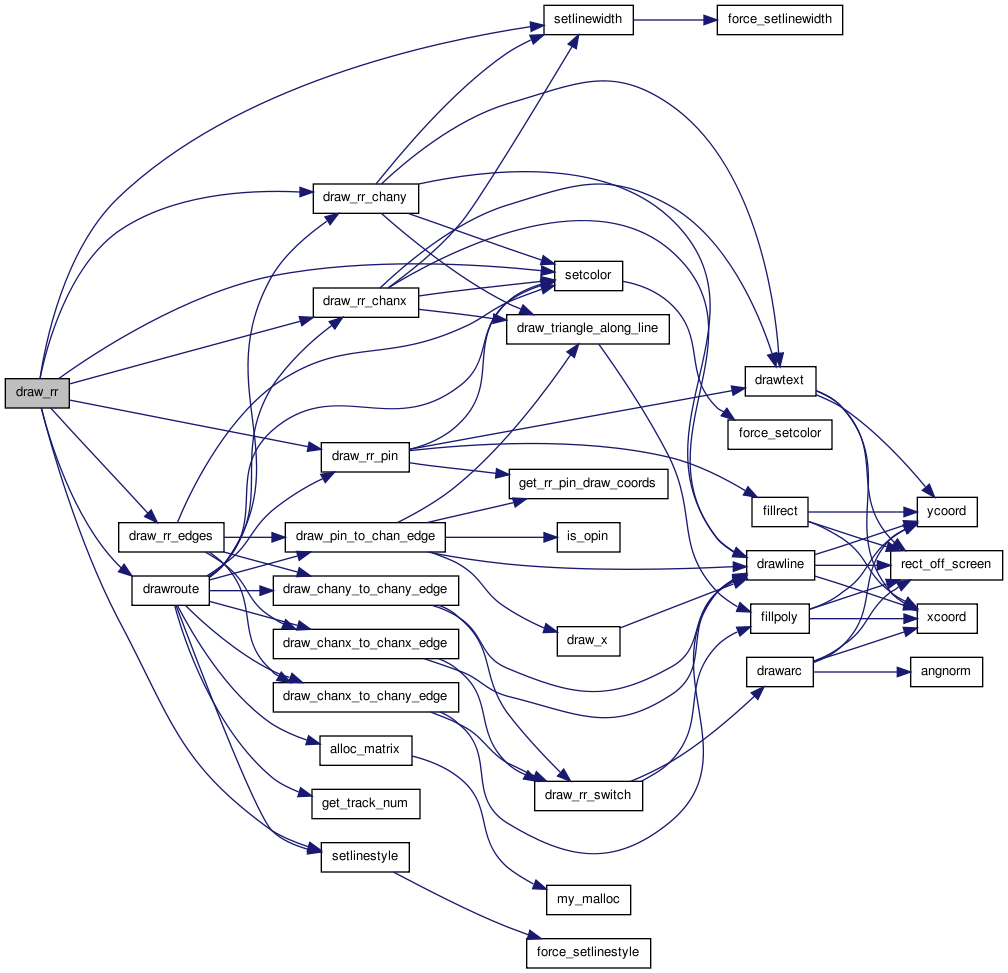
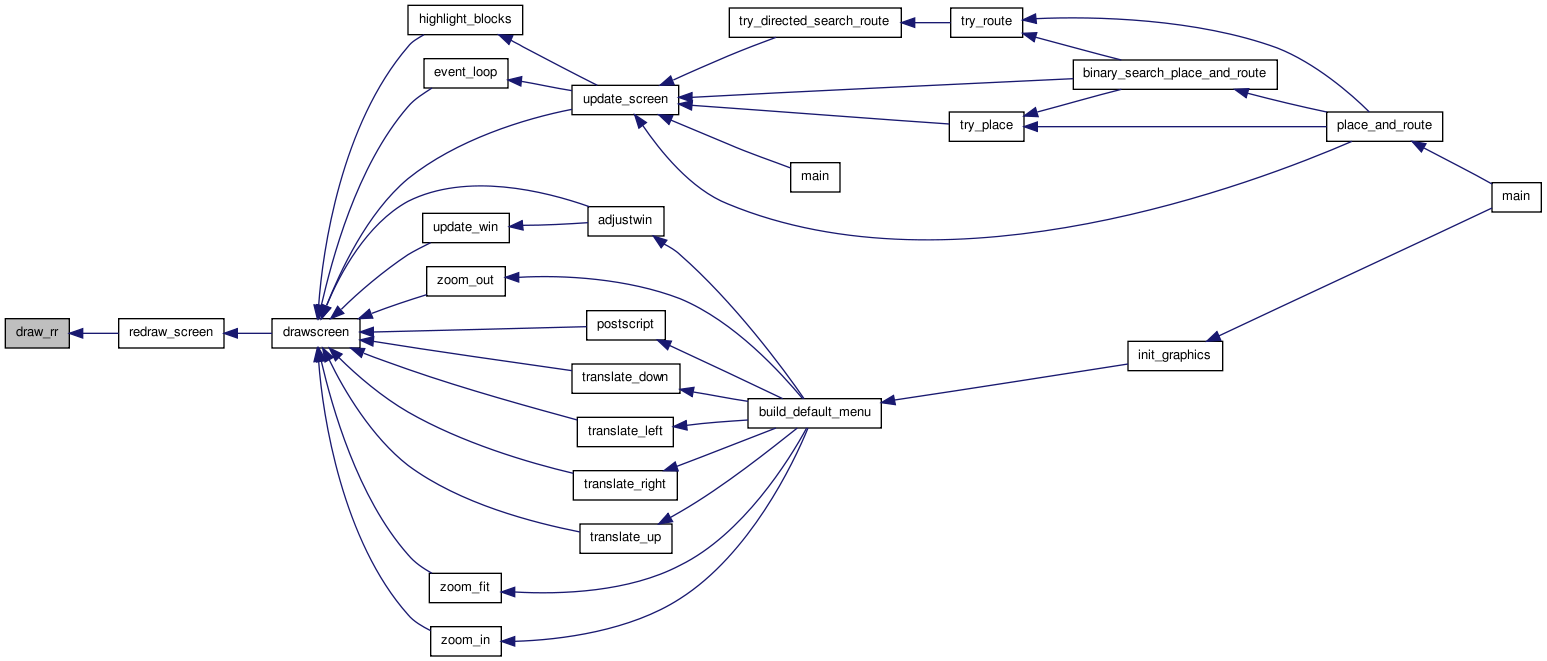
| static void draw_rr_chanx | ( | int | inode, | |
| int | itrack | |||
| ) | [static] |
Definition at line 819 of file draw.c.
00821 { 00822 00823 /* Draws an x-directed channel segment. */ 00824 00825 enum 00826 { BUFFSIZE = 80 }; 00827 float x1, x2, y; 00828 float y1, y2; /* UDSD by AY */ 00829 int k; /* UDSD by AY */ 00830 char str[BUFFSIZE]; 00831 00832 /* Track 0 at bottom edge, closest to "owning" clb. */ 00833 00834 x1 = tile_x[rr_node[inode].xlow]; 00835 x2 = tile_y[rr_node[inode].xhigh] + tile_width; 00836 y = tile_y[rr_node[inode].ylow] + tile_width + 1.0 + itrack; 00837 drawline(x1, y, x2, y); 00838 00839 /* UDSD by AY Start */ 00840 y1 = y - 0.25; 00841 y2 = y + 0.25; 00842 00843 if(rr_node[inode].direction == INC_DIRECTION) 00844 { 00845 setlinewidth(2); 00846 setcolor(YELLOW); 00847 drawline(x1, y1, x1, y2); /* Draw a line at start of wire to indicate mux */ 00848 00849 /* Mux balence numbers */ 00850 setcolor(BLACK); 00851 sprintf(str, "%d", rr_node[inode].fan_in); 00852 drawtext(x1, y, str, 5); 00853 00854 setcolor(BLACK); 00855 setlinewidth(0); 00856 draw_triangle_along_line(x2 - 0.15, y, x1, x2, y, y); 00857 00858 setcolor(LIGHTGREY); 00859 /* TODO: this looks odd, why does it ignore final block? does this mean nothing appears with L=1 ? */ 00860 for(k = rr_node[inode].xlow; k < rr_node[inode].xhigh; k++) 00861 { 00862 x2 = tile_x[k] + tile_width; 00863 draw_triangle_along_line(x2 - 0.15, y, x1, x2, y, y); 00864 x2 = tile_x[k + 1]; 00865 draw_triangle_along_line(x2 + 0.15, y, x1, x2, y, y); 00866 } 00867 setcolor(BLACK); 00868 } 00869 else if(rr_node[inode].direction == DEC_DIRECTION) 00870 { 00871 setlinewidth(2); 00872 setcolor(YELLOW); 00873 drawline(x2, y1, x2, y2); 00874 00875 /* Mux balance numbers */ 00876 setcolor(BLACK); 00877 sprintf(str, "%d", rr_node[inode].fan_in); 00878 drawtext(x2, y, str, 5); 00879 00880 setlinewidth(0); 00881 draw_triangle_along_line(x1 + 0.15, y, x2, x1, y, y); 00882 setcolor(LIGHTGREY); 00883 for(k = rr_node[inode].xhigh; k > rr_node[inode].xlow; k--) 00884 { 00885 x1 = tile_x[k]; 00886 draw_triangle_along_line(x1 + 0.15, y, x2, x1, y, y); 00887 x1 = tile_x[k - 1] + tile_width; 00888 draw_triangle_along_line(x1 - 0.15, y, x2, x1, y, y); 00889 } 00890 setcolor(BLACK); 00891 } 00892 /* UDSD by AY End */ 00893 }
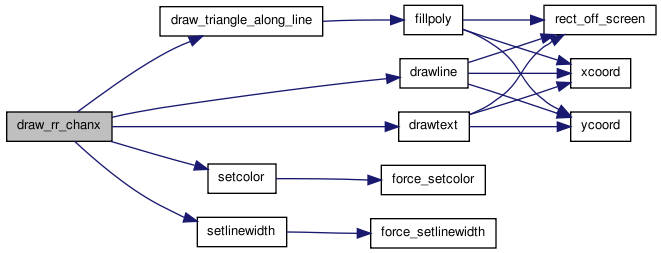
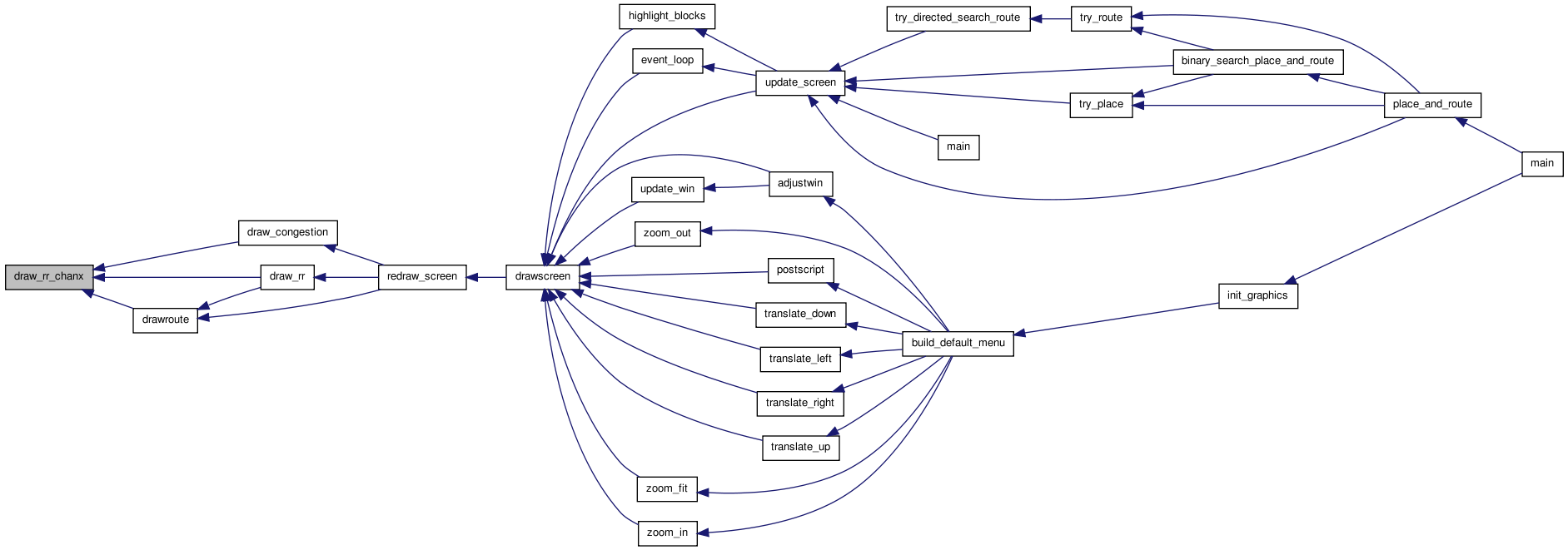
| static void draw_rr_chany | ( | int | inode, | |
| int | itrack | |||
| ) | [static] |
Definition at line 897 of file draw.c.
00899 { 00900 00901 /* Draws a y-directed channel segment. */ 00902 enum 00903 { BUFFSIZE = 80 }; 00904 float x, y1, y2; 00905 float x1, x2; /* UDSD by AY */ 00906 int k; /* UDSD by AY */ 00907 char str[BUFFSIZE]; 00908 00909 /* Track 0 at left edge, closest to "owning" clb. */ 00910 00911 x = tile_x[rr_node[inode].xlow] + tile_width + 1. + itrack; 00912 y1 = tile_y[rr_node[inode].ylow]; 00913 y2 = tile_y[rr_node[inode].yhigh] + tile_width; 00914 drawline(x, y1, x, y2); 00915 00916 /* UDSD by AY Start */ 00917 x1 = x - 0.25; 00918 x2 = x + 0.25; 00919 if(rr_node[inode].direction == INC_DIRECTION) 00920 { 00921 setlinewidth(2); 00922 setcolor(YELLOW); 00923 drawline(x1, y1, x2, y1); 00924 00925 /* UDSD Modifications by WMF Begin */ 00926 setcolor(BLACK); 00927 sprintf(str, "%d", rr_node[inode].fan_in); 00928 drawtext(x, y1, str, 5); 00929 setcolor(BLACK); 00930 /* UDSD Modifications by WMF End */ 00931 00932 setlinewidth(0); 00933 draw_triangle_along_line(x, y2 - 0.15, x, x, y1, y2); 00934 setcolor(LIGHTGREY); 00935 for(k = rr_node[inode].ylow; k < rr_node[inode].yhigh; k++) 00936 { 00937 y2 = tile_y[k] + tile_width; 00938 draw_triangle_along_line(x, y2 - 0.15, x, x, y1, y2); 00939 y2 = tile_y[k + 1]; 00940 draw_triangle_along_line(x, y2 + 0.15, x, x, y1, y2); 00941 } 00942 setcolor(BLACK); 00943 } 00944 else if(rr_node[inode].direction == DEC_DIRECTION) 00945 { 00946 setlinewidth(2); 00947 setcolor(YELLOW); 00948 drawline(x1, y2, x2, y2); 00949 00950 /* UDSD Modifications by WMF Begin */ 00951 setcolor(BLACK); 00952 sprintf(str, "%d", rr_node[inode].fan_in); 00953 drawtext(x, y2, str, 5); 00954 setcolor(BLACK); 00955 /* UDSD Modifications by WMF End */ 00956 00957 setlinewidth(0); 00958 draw_triangle_along_line(x, y1 + 0.15, x, x, y2, y1); 00959 setcolor(LIGHTGREY); 00960 for(k = rr_node[inode].yhigh; k > rr_node[inode].ylow; k--) 00961 { 00962 y1 = tile_y[k]; 00963 draw_triangle_along_line(x, y1 + 0.15, x, x, y2, y1); 00964 y1 = tile_y[k - 1] + tile_width; 00965 draw_triangle_along_line(x, y1 - 0.15, x, x, y2, y1); 00966 } 00967 setcolor(BLACK); 00968 } 00969 /* UDSD by AY End */ 00970 }
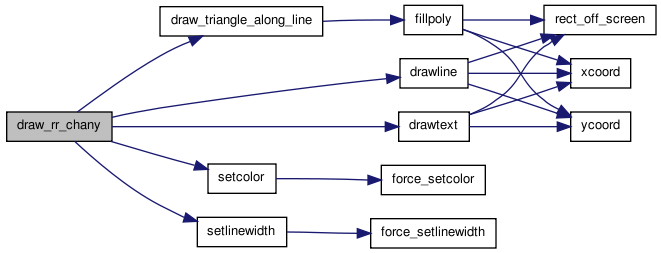
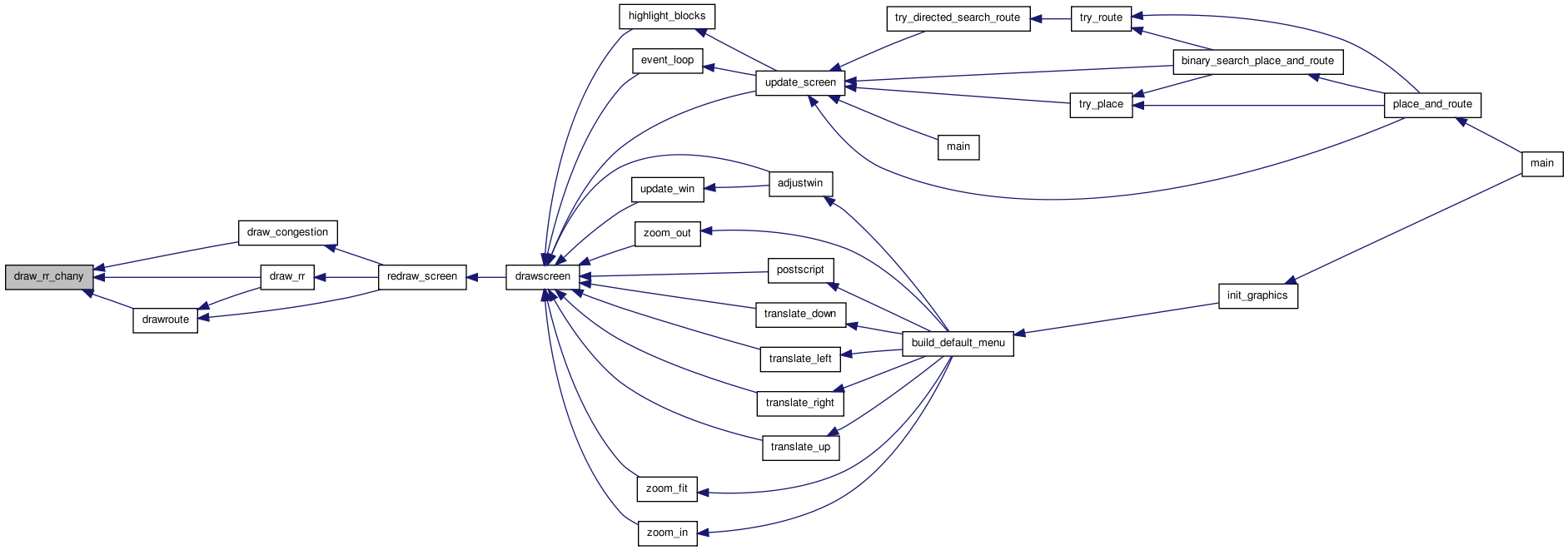
| static void draw_rr_edges | ( | int | from_node | ) | [static] |
Definition at line 974 of file draw.c.
00975 { 00976 00977 /* Draws all the edges that the user wants shown between inode and what it * 00978 * connects to. inode is assumed to be a CHANX, CHANY, or OPIN. */ 00979 00980 t_rr_type from_type, to_type; 00981 int iedge, to_node, from_ptc_num, to_ptc_num; 00982 short switch_type; 00983 00984 from_type = rr_node[inode].type; 00985 00986 if((draw_rr_toggle == DRAW_NODES_RR) || 00987 (draw_rr_toggle == DRAW_NODES_AND_SBOX_RR && from_type == OPIN)) 00988 { 00989 return; /* Nothing to draw. */ 00990 } 00991 00992 from_ptc_num = rr_node[inode].ptc_num; 00993 00994 for(iedge = 0; iedge < rr_node[inode].num_edges; iedge++) 00995 { 00996 to_node = rr_node[inode].edges[iedge]; 00997 to_type = rr_node[to_node].type; 00998 to_ptc_num = rr_node[to_node].ptc_num; 00999 01000 switch (from_type) 01001 { 01002 01003 case OPIN: 01004 switch (to_type) 01005 { 01006 case CHANX: 01007 case CHANY: 01008 setcolor(RED); 01009 draw_pin_to_chan_edge(inode, to_node); 01010 break; 01011 01012 default: 01013 printf 01014 ("Error in draw_rr_edges: node %d (type: %d) connects to \n" 01015 "node %d (type: %d).\n", inode, from_type, 01016 to_node, to_type); 01017 exit(1); 01018 break; 01019 } 01020 break; 01021 01022 case CHANX: /* from_type */ 01023 switch (to_type) 01024 { 01025 case IPIN: 01026 if(draw_rr_toggle == DRAW_NODES_AND_SBOX_RR) 01027 { 01028 break; 01029 } 01030 01031 setcolor(BLUE); 01032 draw_pin_to_chan_edge(to_node, inode); 01033 break; 01034 01035 case CHANX: 01036 setcolor(DARKGREEN); 01037 switch_type = rr_node[inode].switches[iedge]; 01038 draw_chanx_to_chanx_edge(inode, from_ptc_num, 01039 to_node, to_ptc_num, 01040 switch_type); 01041 break; 01042 01043 case CHANY: 01044 setcolor(DARKGREEN); 01045 switch_type = rr_node[inode].switches[iedge]; 01046 draw_chanx_to_chany_edge(inode, from_ptc_num, 01047 to_node, to_ptc_num, 01048 FROM_X_TO_Y, 01049 switch_type); 01050 break; 01051 01052 default: 01053 printf 01054 ("Error in draw_rr_edges: node %d (type: %d) connects to \n" 01055 "node %d (type: %d).\n", inode, from_type, 01056 to_node, to_type); 01057 exit(1); 01058 break; 01059 } 01060 break; 01061 01062 01063 case CHANY: /* from_type */ 01064 switch (to_type) 01065 { 01066 case IPIN: 01067 if(draw_rr_toggle == DRAW_NODES_AND_SBOX_RR) 01068 { 01069 break; 01070 } 01071 01072 setcolor(BLUE); 01073 draw_pin_to_chan_edge(to_node, inode); 01074 break; 01075 01076 case CHANX: 01077 setcolor(DARKGREEN); 01078 switch_type = rr_node[inode].switches[iedge]; 01079 draw_chanx_to_chany_edge(to_node, to_ptc_num, 01080 inode, from_ptc_num, 01081 FROM_Y_TO_X, 01082 switch_type); 01083 break; 01084 01085 case CHANY: 01086 setcolor(DARKGREEN); 01087 switch_type = rr_node[inode].switches[iedge]; 01088 draw_chany_to_chany_edge(inode, from_ptc_num, 01089 to_node, to_ptc_num, 01090 switch_type); 01091 break; 01092 01093 default: 01094 printf 01095 ("Error in draw_rr_edges: node %d (type: %d) connects to \n" 01096 "node %d (type: %d).\n", inode, from_type, 01097 to_node, to_type); 01098 exit(1); 01099 break; 01100 } 01101 break; 01102 01103 default: /* from_type */ 01104 printf 01105 ("Error: draw_rr_edges called with node %d of type %d.\n", 01106 inode, from_type); 01107 exit(1); 01108 break; 01109 } 01110 } /* End of for each edge loop */ 01111 }
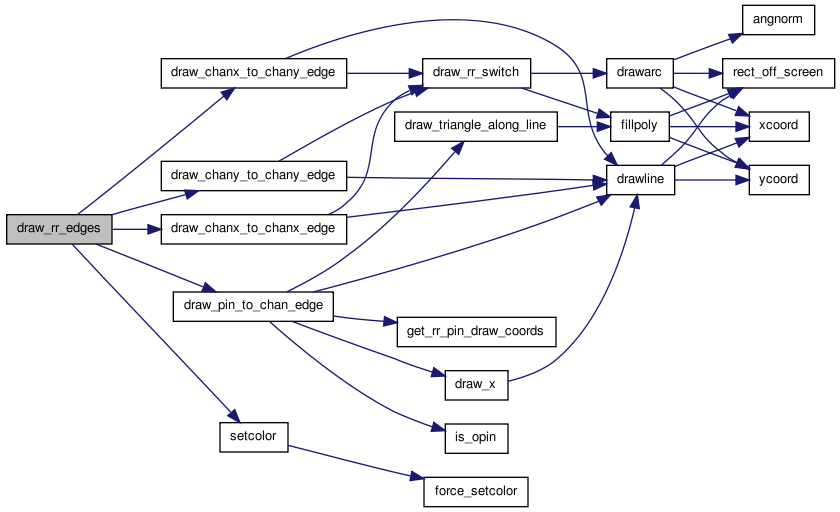
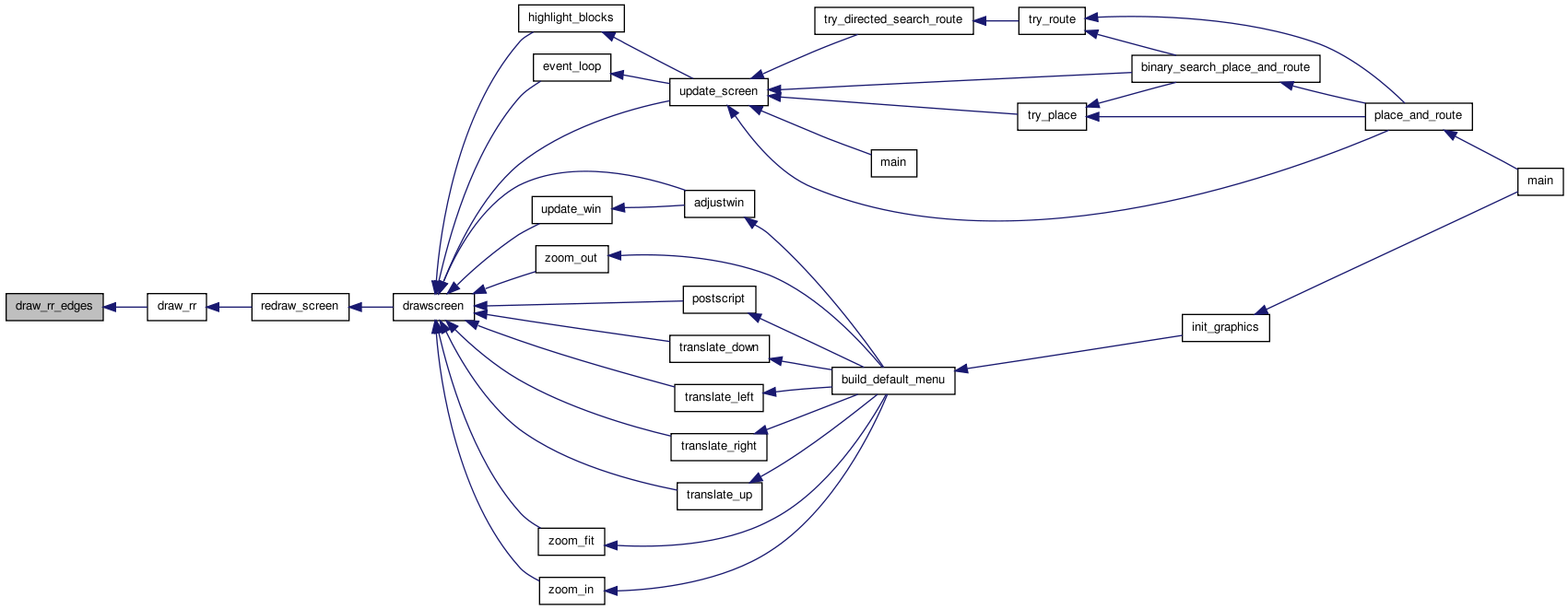
| static void draw_rr_pin | ( | int | inode, | |
| enum color_types | color | |||
| ) | [static] |
Definition at line 1478 of file draw.c.
01480 { 01481 01482 /* Draws an IPIN or OPIN rr_node. Note that the pin can appear on more * 01483 * than one side of a clb. Also note that this routine can change the * 01484 * current color to BLACK. */ 01485 01486 int ipin, i, j, iside, iclass, ioff; 01487 float xcen, ycen; 01488 char str[BUFSIZE]; 01489 t_type_ptr type; 01490 01491 i = rr_node[inode].xlow; 01492 j = rr_node[inode].ylow; 01493 ipin = rr_node[inode].ptc_num; 01494 type = grid[i][j].type; 01495 ioff = grid[i][j].offset; 01496 01497 setcolor(color); 01498 iclass = type->pin_class[ipin]; 01499 /* TODO: This is where we can hide fringe physical pins and also identify globals (hide, color, show) */ 01500 for(iside = 0; iside < 4; iside++) 01501 { 01502 if(type->pinloc[grid[i][j].offset][iside][ipin]) 01503 { /* Pin exists on this side. */ 01504 get_rr_pin_draw_coords(inode, iside, ioff, &xcen, &ycen); 01505 fillrect(xcen - pin_size, ycen - pin_size, 01506 xcen + pin_size, ycen + pin_size); 01507 sprintf(str, "%d", ipin); 01508 setcolor(BLACK); 01509 drawtext(xcen, ycen, str, 2 * pin_size); 01510 setcolor(color); 01511 } 01512 } 01513 }
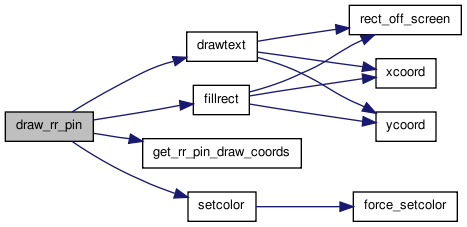
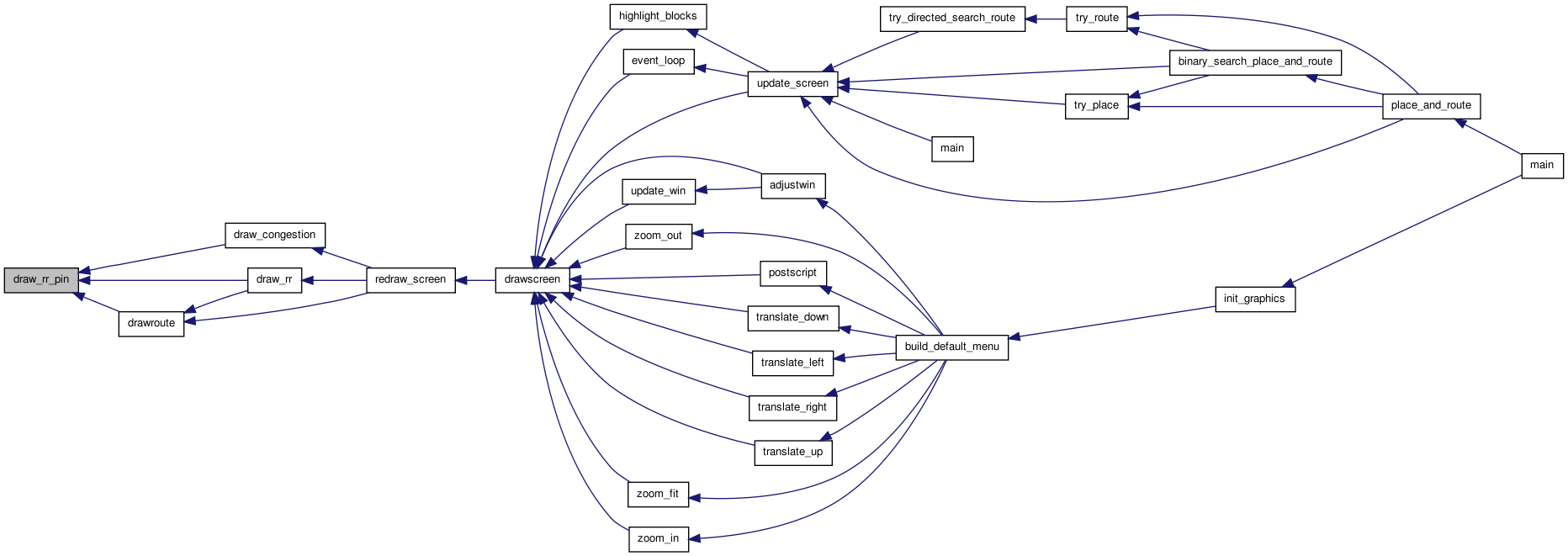
| static void draw_rr_switch | ( | float | from_x, | |
| float | from_y, | |||
| float | to_x, | |||
| float | to_y, | |||
| boolean | buffered | |||
| ) | [static] |
Definition at line 1430 of file draw.c.
01435 { 01436 01437 /* Draws a buffer (triangle) or pass transistor (circle) on the edge * 01438 * connecting from to to, depending on the status of buffered. The drawing * 01439 * is closest to the from_node, since it reflects the switch type of from. */ 01440 01441 const float switch_rad = 0.15; 01442 float magnitude, xcen, ycen, xdelta, ydelta, xbaseline, ybaseline; 01443 float xunit, yunit; 01444 t_point poly[3]; 01445 01446 xcen = from_x + (to_x - from_x) / 10.; 01447 ycen = from_y + (to_y - from_y) / 10.; 01448 01449 if(!buffered) 01450 { /* Draw a circle for a pass transistor */ 01451 drawarc(xcen, ycen, switch_rad, 0., 360.); 01452 } 01453 else 01454 { /* Buffer */ 01455 xdelta = to_x - from_x; 01456 ydelta = to_y - from_y; 01457 magnitude = sqrt(xdelta * xdelta + ydelta * ydelta); 01458 xunit = xdelta / magnitude; 01459 yunit = ydelta / magnitude; 01460 poly[0].x = xcen + xunit * switch_rad; 01461 poly[0].y = ycen + yunit * switch_rad; 01462 xbaseline = xcen - xunit * switch_rad; 01463 ybaseline = ycen - yunit * switch_rad; 01464 01465 /* Recall: perpendicular vector to the unit vector along the switch (xv, yv) * 01466 * is (yv, -xv). */ 01467 01468 poly[1].x = xbaseline + yunit * switch_rad; 01469 poly[1].y = ybaseline - xunit * switch_rad; 01470 poly[2].x = xbaseline - yunit * switch_rad; 01471 poly[2].y = ybaseline + xunit * switch_rad; 01472 fillpoly(poly, 3); 01473 } 01474 }
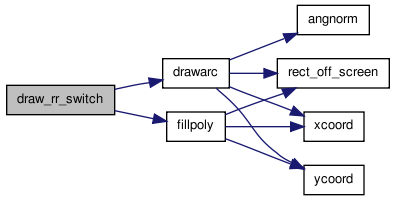

| static void draw_triangle_along_line | ( | float | xend, | |
| float | yend, | |||
| float | x1, | |||
| float | x2, | |||
| float | y1, | |||
| float | y2 | |||
| ) | [static] |
Definition at line 1964 of file draw.c.
01970 { 01971 float switch_rad = 0.15; 01972 float xdelta, ydelta; 01973 float magnitude; 01974 float xunit, yunit; 01975 float xbaseline, ybaseline; 01976 t_point poly[3]; 01977 01978 xdelta = x2 - x1; 01979 ydelta = y2 - y1; 01980 magnitude = sqrt(xdelta * xdelta + ydelta * ydelta); 01981 xunit = xdelta / magnitude; 01982 yunit = ydelta / magnitude; 01983 01984 poly[0].x = xend + xunit * switch_rad; 01985 poly[0].y = yend + yunit * switch_rad; 01986 xbaseline = xend - xunit * switch_rad; 01987 ybaseline = yend - yunit * switch_rad; 01988 poly[1].x = xbaseline + yunit * switch_rad; 01989 poly[1].y = ybaseline - xunit * switch_rad; 01990 poly[2].x = xbaseline - yunit * switch_rad; 01991 poly[2].y = ybaseline + xunit * switch_rad; 01992 01993 fillpoly(poly, 3); 01994 }
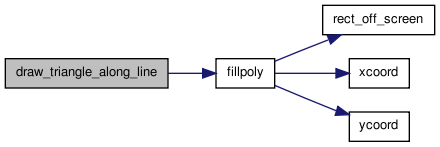

| static void draw_x | ( | float | x, | |
| float | y, | |||
| float | size | |||
| ) | [static] |
Definition at line 1114 of file draw.c.
01117 { 01118 01119 /* Draws an X centered at (x,y). The width and height of the X are each * 01120 * 2 * size. */ 01121 01122 drawline(x - size, y + size, x + size, y - size); 01123 drawline(x - size, y - size, x + size, y + size); 01124 }
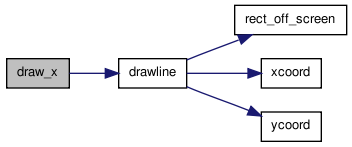

| static void drawnets | ( | void | ) | [static] |
Definition at line 637 of file draw.c.
00638 { 00639 00640 /* This routine draws the nets on the placement. The nets have not * 00641 * yet been routed, so we just draw a chain showing a possible path * 00642 * for each net. This gives some idea of future congestion. */ 00643 00644 int inet, ipin, b1, b2; 00645 float x1, y1, x2, y2; 00646 00647 setlinestyle(SOLID); 00648 setlinewidth(0); 00649 00650 /* Draw the net as a star from the source to each sink. Draw from centers of * 00651 * blocks (or sub blocks in the case of IOs). */ 00652 00653 for(inet = 0; inet < num_nets; inet++) 00654 { 00655 if(net[inet].is_global) 00656 continue; /* Don't draw global nets. */ 00657 00658 setcolor(net_color[inet]); 00659 b1 = net[inet].node_block[0]; /* The DRIVER */ 00660 get_block_center(b1, &x1, &y1); 00661 00662 for(ipin = 1; ipin < (net[inet].num_sinks + 1); ipin++) 00663 { 00664 b2 = net[inet].node_block[ipin]; 00665 get_block_center(b2, &x2, &y2); 00666 drawline(x1, y1, x2, y2); 00667 00668 /* Uncomment to draw a chain instead of a star. */ 00669 /* x1 = x2; */ 00670 /* y1 = y2; */ 00671 } 00672 } 00673 }
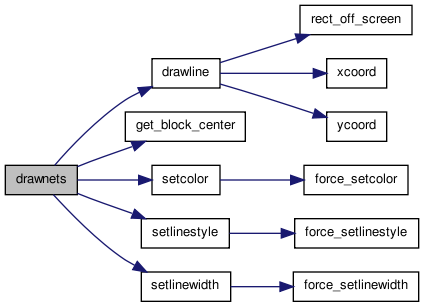
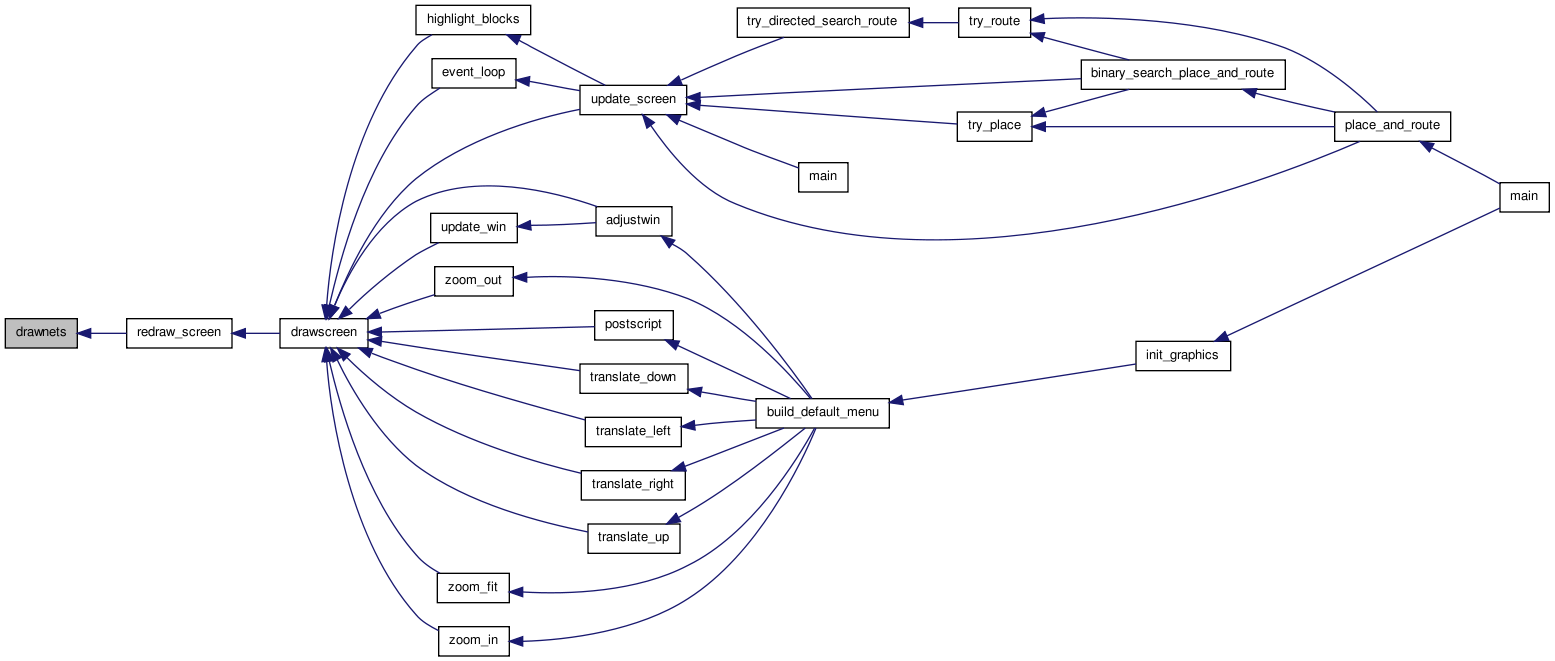
| static void drawplace | ( | void | ) | [static] |
Definition at line 519 of file draw.c.
00520 { 00521 00522 /* Draws the blocks placed on the proper clbs. Occupied blocks are darker colours * 00523 * while empty ones are lighter colours and have a dashed border. */ 00524 00525 float sub_tile_step; 00526 float x1, y1, x2, y2; 00527 int i, j, k, bnum; 00528 int num_sub_tiles; 00529 int height; 00530 00531 setlinewidth(0); 00532 00533 for(i = 0; i <= (nx + 1); i++) 00534 { 00535 for(j = 0; j <= (ny + 1); j++) 00536 { 00537 /* Only the first block of a group should control drawing */ 00538 if(grid[i][j].offset > 0) 00539 continue; 00540 00541 /* Don't draw corners */ 00542 if(((i < 1) || (i > nx)) && ((j < 1) || (j > ny))) 00543 continue; 00544 00545 num_sub_tiles = grid[i][j].type->capacity; 00546 sub_tile_step = tile_width / num_sub_tiles; 00547 height = grid[i][j].type->height; 00548 00549 if(num_sub_tiles < 1) 00550 { 00551 setcolor(BLACK); 00552 setlinestyle(DASHED); 00553 drawrect(tile_x[i], tile_y[j], 00554 tile_x[i] + tile_width, 00555 tile_y[j] + tile_width); 00556 draw_x(tile_x[i] + (tile_width / 2), 00557 tile_y[j] + (tile_width / 2), 00558 (tile_width / 2)); 00559 } 00560 00561 for(k = 0; k < num_sub_tiles; ++k) 00562 { 00563 /* Graphics will look unusual for multiple height and capacity */ 00564 assert(height == 1 || num_sub_tiles == 1); 00565 /* Get coords of current sub_tile */ 00566 if((i < 1) || (i > nx)) 00567 { /* left and right fringes */ 00568 x1 = tile_x[i]; 00569 y1 = tile_y[j] + (k * sub_tile_step); 00570 x2 = x1 + tile_width; 00571 y2 = y1 + sub_tile_step; 00572 } 00573 else if((j < 1) || (j > ny)) 00574 { /* top and bottom fringes */ 00575 x1 = tile_x[i] + (k * sub_tile_step); 00576 y1 = tile_y[j]; 00577 x2 = x1 + sub_tile_step; 00578 y2 = y1 + tile_width; 00579 } 00580 else 00581 { 00582 assert(num_sub_tiles <= 1); /* Need to change draw code to support */ 00583 00584 x1 = tile_x[i]; 00585 y1 = tile_y[j]; 00586 x2 = x1 + tile_width; 00587 y2 = tile_y[j + height - 1] + tile_width; 00588 } 00589 00590 /* Look at the tile at start of large block */ 00591 bnum = grid[i][j].blocks[k]; 00592 00593 00594 /* Draw background */ 00595 if(bnum != EMPTY) 00596 { 00597 setcolor(block_color[bnum]); 00598 fillrect(x1, y1, x2, y2); 00599 } else { 00600 // colour empty blocks a particular colour depending on type 00601 if(grid[i][j].type->index < 3) { 00602 setcolor(WHITE); 00603 } else if(grid[i][j].type->index < 3 + MAX_BLOCK_COLOURS) { 00604 setcolor(BISQUE + grid[i][j].type->index - 3); 00605 } else { 00606 setcolor(BISQUE + MAX_BLOCK_COLOURS - 1); 00607 } 00608 fillrect(x1, y1, x2, y2); 00609 } 00610 00611 setcolor(BLACK); 00612 00613 setlinestyle((EMPTY == bnum) ? DASHED : SOLID); 00614 drawrect(x1, y1, x2, y2); 00615 00616 /* Draw text if the space has parts of the netlist */ 00617 if(bnum != EMPTY) 00618 { 00619 drawtext((x1 + x2) / 2.0, (y1 + y2) / 2.0, 00620 block[bnum].name, tile_width); 00621 } 00622 00623 /* Draw text for block type so that user knows what block */ 00624 if(grid[i][j].offset == 0) { 00625 if(i > 0 && i <= nx && j > 0 && j <= ny) { 00626 drawtext((x1 + x2) / 2.0, y1 + (tile_width / 4.0), 00627 grid[i][j].type->name, tile_width); 00628 } 00629 } 00630 } 00631 } 00632 } 00633 }
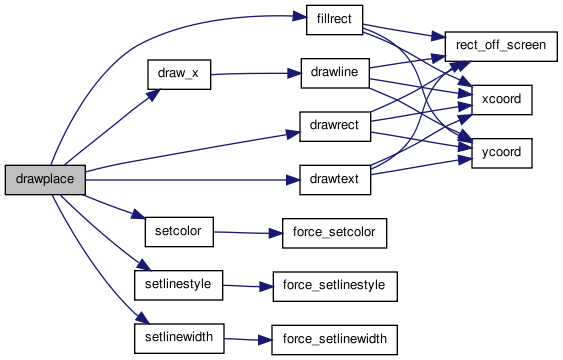
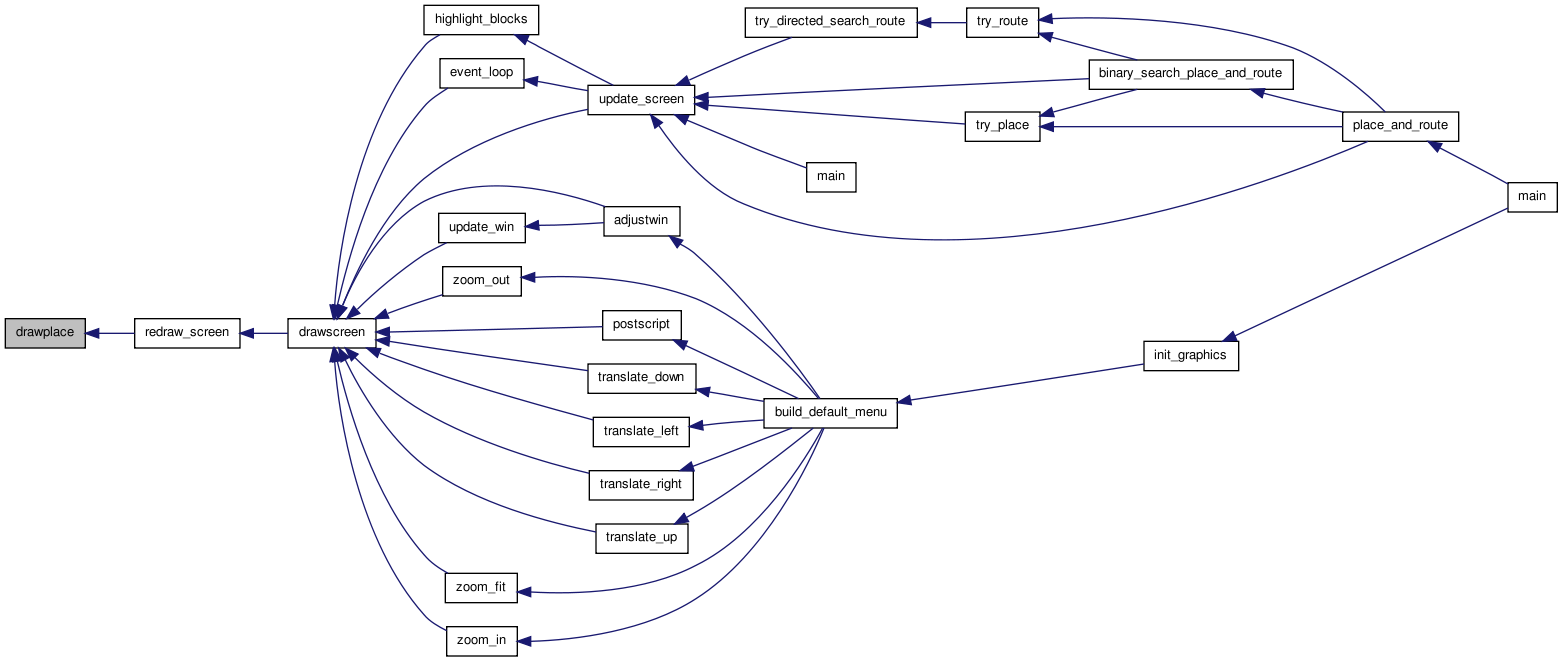
| static void drawroute | ( | enum e_draw_net_type | draw_net_type | ) | [static] |
Definition at line 1583 of file draw.c.
01584 { 01585 01586 /* Draws the nets in the positions fixed by the router. If draw_net_type is * 01587 * ALL_NETS, draw all the nets. If it is HIGHLIGHTED, draw only the nets * 01588 * that are not coloured black (useful for drawing over the rr_graph). */ 01589 01590 /* Next free track in each channel segment if routing is GLOBAL */ 01591 01592 static int **chanx_track = NULL; /* [1..nx][0..ny] */ 01593 static int **chany_track = NULL; /* [0..nx][1..ny] */ 01594 01595 int inet, i, j, inode, prev_node, prev_track, itrack; 01596 short switch_type; 01597 struct s_trace *tptr; 01598 t_rr_type rr_type, prev_type; 01599 01600 01601 if(draw_route_type == GLOBAL) 01602 { 01603 /* Allocate some temporary storage if it's not already available. */ 01604 if(chanx_track == NULL) 01605 { 01606 chanx_track = 01607 (int **)alloc_matrix(1, nx, 0, ny, sizeof(int)); 01608 } 01609 01610 if(chany_track == NULL) 01611 { 01612 chany_track = 01613 (int **)alloc_matrix(0, nx, 1, ny, sizeof(int)); 01614 } 01615 01616 for(i = 1; i <= nx; i++) 01617 for(j = 0; j <= ny; j++) 01618 chanx_track[i][j] = (-1); 01619 01620 for(i = 0; i <= nx; i++) 01621 for(j = 1; j <= ny; j++) 01622 chany_track[i][j] = (-1); 01623 } 01624 01625 setlinestyle(SOLID); 01626 01627 /* Now draw each net, one by one. */ 01628 01629 for(inet = 0; inet < num_nets; inet++) 01630 { 01631 if(net[inet].is_global) /* Don't draw global nets. */ 01632 continue; 01633 01634 if(trace_head[inet] == NULL) /* No routing. Skip. (Allows me to draw */ 01635 continue; /* partially complete routes). */ 01636 01637 if(draw_net_type == HIGHLIGHTED && net_color[inet] == BLACK) 01638 continue; 01639 01640 setcolor(net_color[inet]); 01641 tptr = trace_head[inet]; /* SOURCE to start */ 01642 inode = tptr->index; 01643 rr_type = rr_node[inode].type; 01644 01645 01646 for(;;) 01647 { 01648 prev_node = inode; 01649 prev_type = rr_type; 01650 switch_type = tptr->iswitch; 01651 tptr = tptr->next; 01652 inode = tptr->index; 01653 rr_type = rr_node[inode].type; 01654 01655 switch (rr_type) 01656 { 01657 01658 case OPIN: 01659 draw_rr_pin(inode, net_color[inet]); 01660 break; 01661 01662 case IPIN: 01663 draw_rr_pin(inode, net_color[inet]); 01664 prev_track = 01665 get_track_num(prev_node, chanx_track, 01666 chany_track); 01667 draw_pin_to_chan_edge(inode, prev_node); 01668 break; 01669 01670 case CHANX: 01671 if(draw_route_type == GLOBAL) 01672 chanx_track[rr_node[inode]. 01673 xlow][rr_node[inode].ylow]++; 01674 01675 itrack = 01676 get_track_num(inode, chanx_track, 01677 chany_track); 01678 draw_rr_chanx(inode, itrack); 01679 01680 switch (prev_type) 01681 { 01682 01683 case CHANX: 01684 prev_track = 01685 get_track_num(prev_node, chanx_track, 01686 chany_track); 01687 draw_chanx_to_chanx_edge(prev_node, 01688 prev_track, 01689 inode, itrack, 01690 switch_type); 01691 break; 01692 01693 case CHANY: 01694 prev_track = 01695 get_track_num(prev_node, chanx_track, 01696 chany_track); 01697 draw_chanx_to_chany_edge(inode, itrack, 01698 prev_node, 01699 prev_track, 01700 FROM_Y_TO_X, 01701 switch_type); 01702 break; 01703 01704 case OPIN: 01705 draw_pin_to_chan_edge(prev_node, inode); 01706 break; 01707 01708 default: 01709 printf 01710 ("Error in drawroute: Unexpected connection from an \n" 01711 "rr_node of type %d to one of type %d.\n", 01712 prev_type, rr_type); 01713 exit(1); 01714 } 01715 01716 break; 01717 01718 case CHANY: 01719 if(draw_route_type == GLOBAL) 01720 chany_track[rr_node[inode]. 01721 xlow][rr_node[inode].ylow]++; 01722 01723 itrack = 01724 get_track_num(inode, chanx_track, 01725 chany_track); 01726 draw_rr_chany(inode, itrack); 01727 01728 switch (prev_type) 01729 { 01730 01731 case CHANX: 01732 prev_track = 01733 get_track_num(prev_node, chanx_track, 01734 chany_track); 01735 draw_chanx_to_chany_edge(prev_node, 01736 prev_track, 01737 inode, itrack, 01738 FROM_X_TO_Y, 01739 switch_type); 01740 break; 01741 01742 case CHANY: 01743 prev_track = 01744 get_track_num(prev_node, chanx_track, 01745 chany_track); 01746 draw_chany_to_chany_edge(prev_node, 01747 prev_track, 01748 inode, itrack, 01749 switch_type); 01750 break; 01751 01752 case OPIN: 01753 draw_pin_to_chan_edge(prev_node, inode); 01754 01755 break; 01756 01757 default: 01758 printf 01759 ("Error in drawroute: Unexpected connection from an \n" 01760 "rr_node of type %d to one of type %d.\n", 01761 prev_type, rr_type); 01762 exit(1); 01763 } 01764 01765 break; 01766 01767 default: 01768 break; 01769 01770 } 01771 01772 if(rr_type == SINK) 01773 { /* Skip the next segment */ 01774 tptr = tptr->next; 01775 if(tptr == NULL) 01776 break; 01777 inode = tptr->index; 01778 rr_type = rr_node[inode].type; 01779 } 01780 01781 } /* End loop over traceback. */ 01782 } /* End for (each net) */ 01783 }
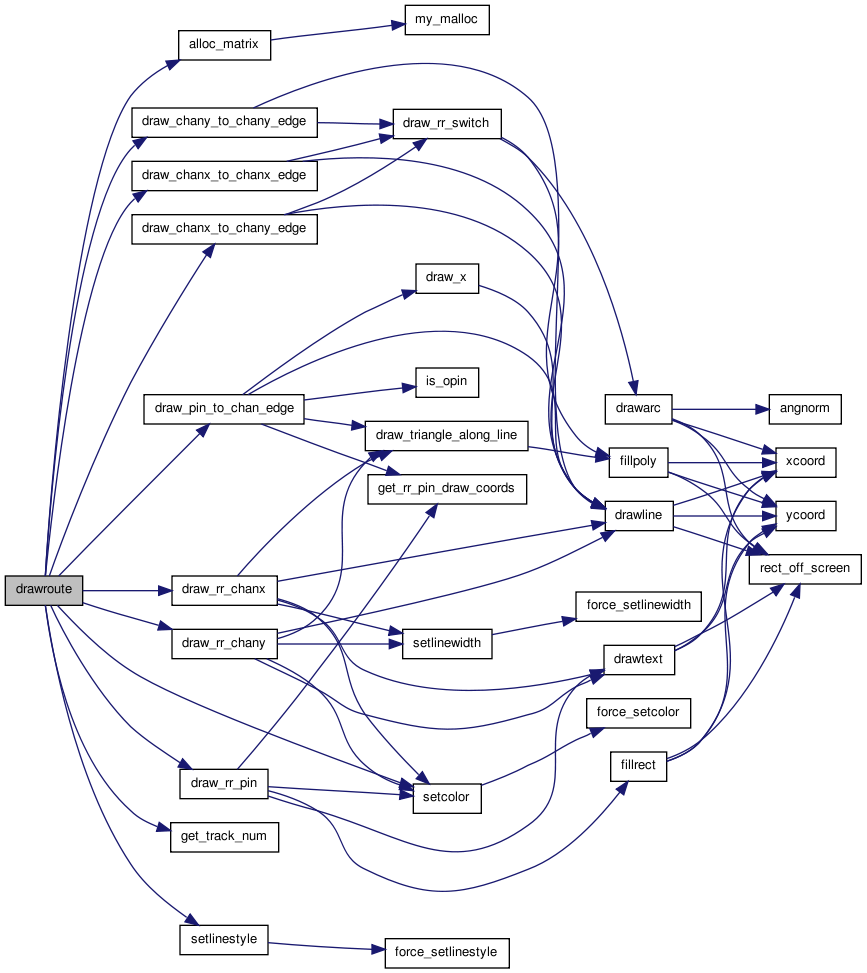
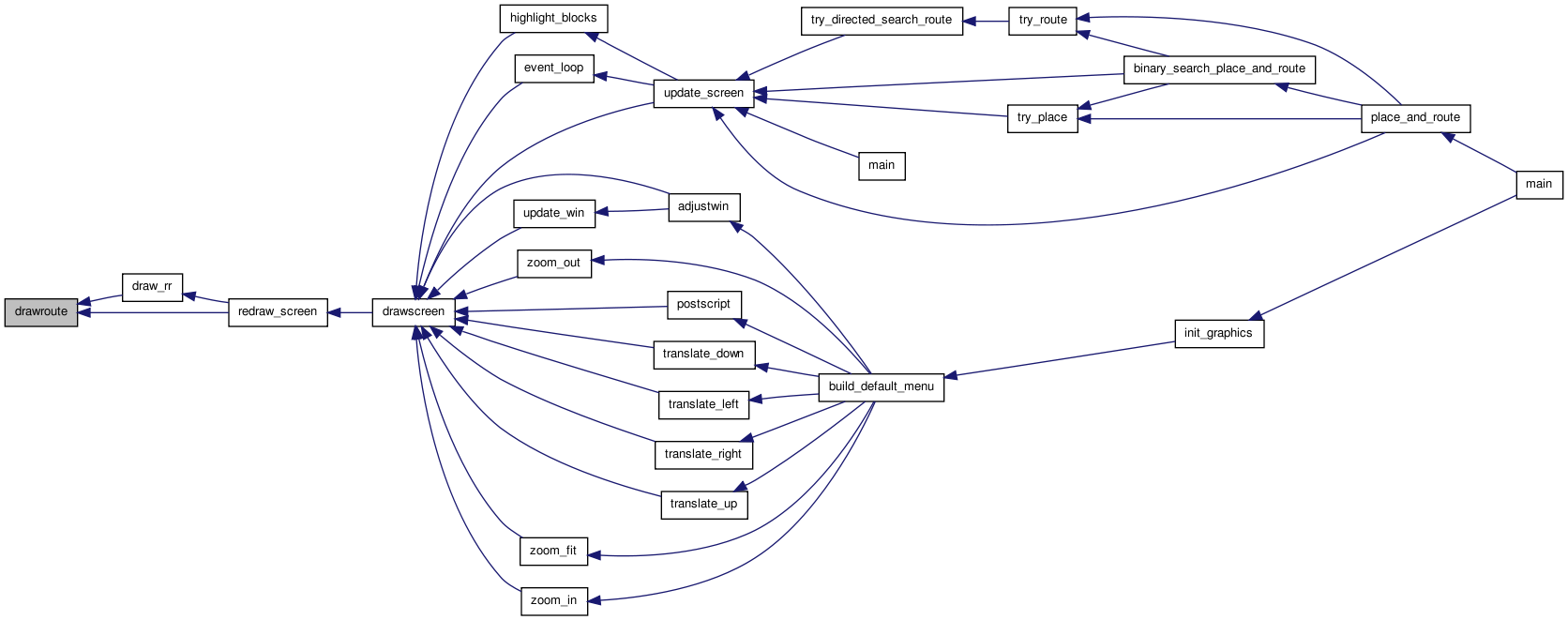
| static void drawscreen | ( | void | ) | [static] |
Definition at line 252 of file draw.c.
00253 { 00254 00255 /* This is the screen redrawing routine that event_loop assumes exists. * 00256 * It erases whatever is on screen, then calls redraw_screen to redraw * 00257 * it. */ 00258 00259 clearscreen(); 00260 redraw_screen(); 00261 }
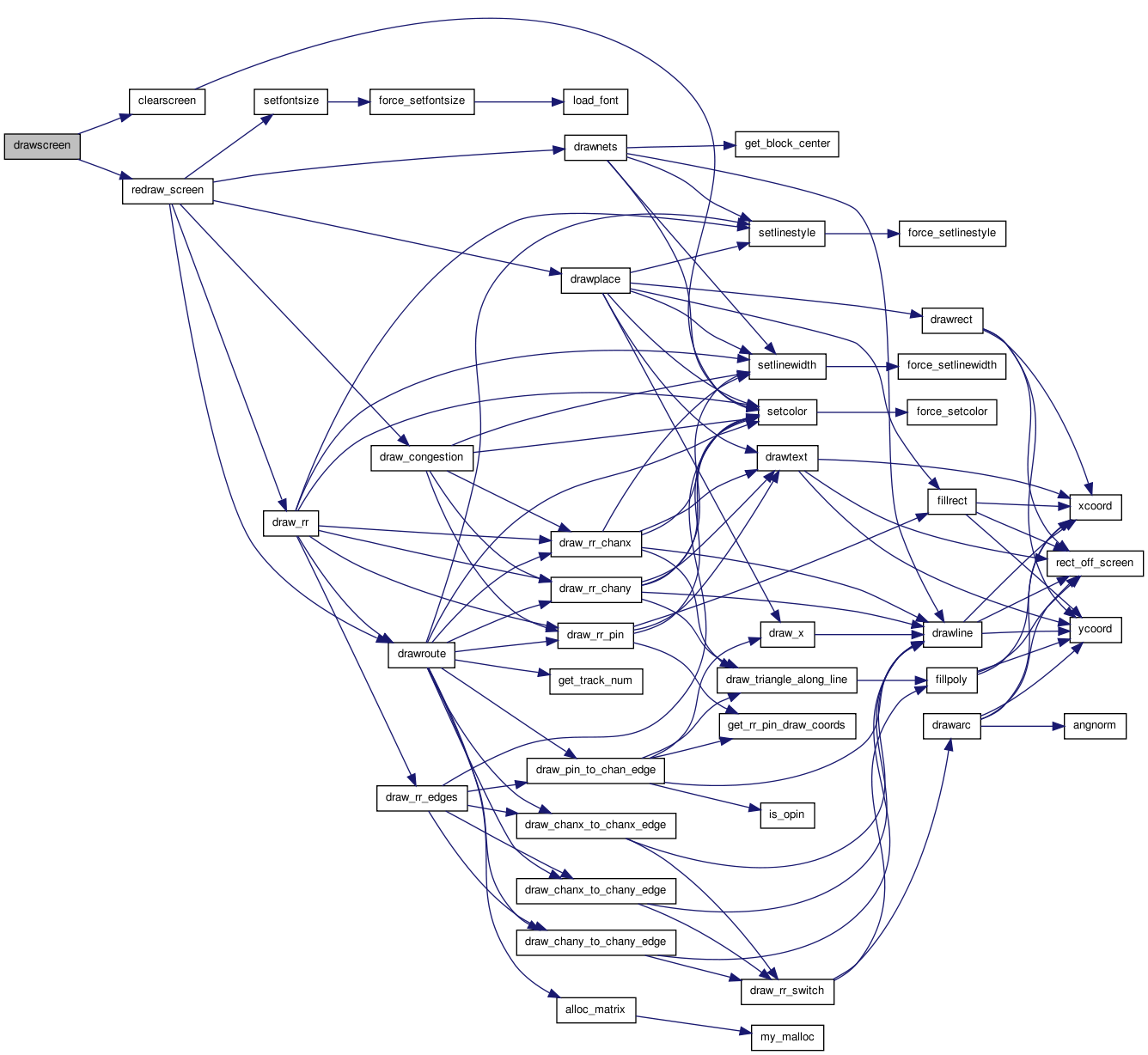
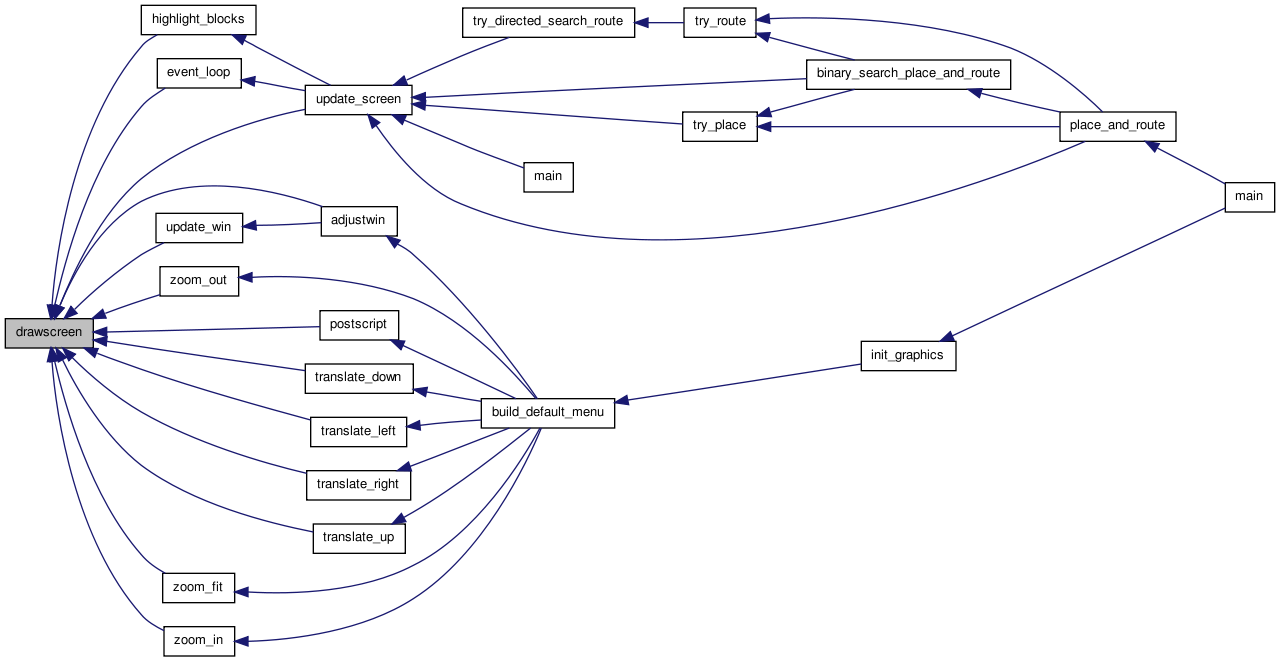
| static void get_block_center | ( | int | bnum, | |
| float * | x, | |||
| float * | y | |||
| ) | [static] |
Definition at line 677 of file draw.c.
00680 { 00681 00682 /* This routine finds the center of block bnum in the current placement, * 00683 * and returns it in *x and *y. This is used in routine shownets. */ 00684 00685 int i, j, k; 00686 float sub_tile_step; 00687 00688 i = block[bnum].x; 00689 j = block[bnum].y; 00690 k = block[bnum].z; 00691 00692 sub_tile_step = tile_width / block[bnum].type->capacity; 00693 00694 if((i < 1) || (i > nx)) 00695 { /* Left and right fringe */ 00696 *x = tile_x[i] + (sub_tile_step * (k + 0.5)); 00697 } 00698 else 00699 { 00700 *x = tile_x[i] + (tile_width / 2.0); 00701 } 00702 00703 if((j < 1) || (j > ny)) 00704 { /* Top and bottom fringe */ 00705 *y = tile_y[j] + (sub_tile_step * (k + 0.5)); 00706 } 00707 else 00708 { 00709 *y = tile_y[j] + (tile_width / 2.0); 00710 } 00711 }
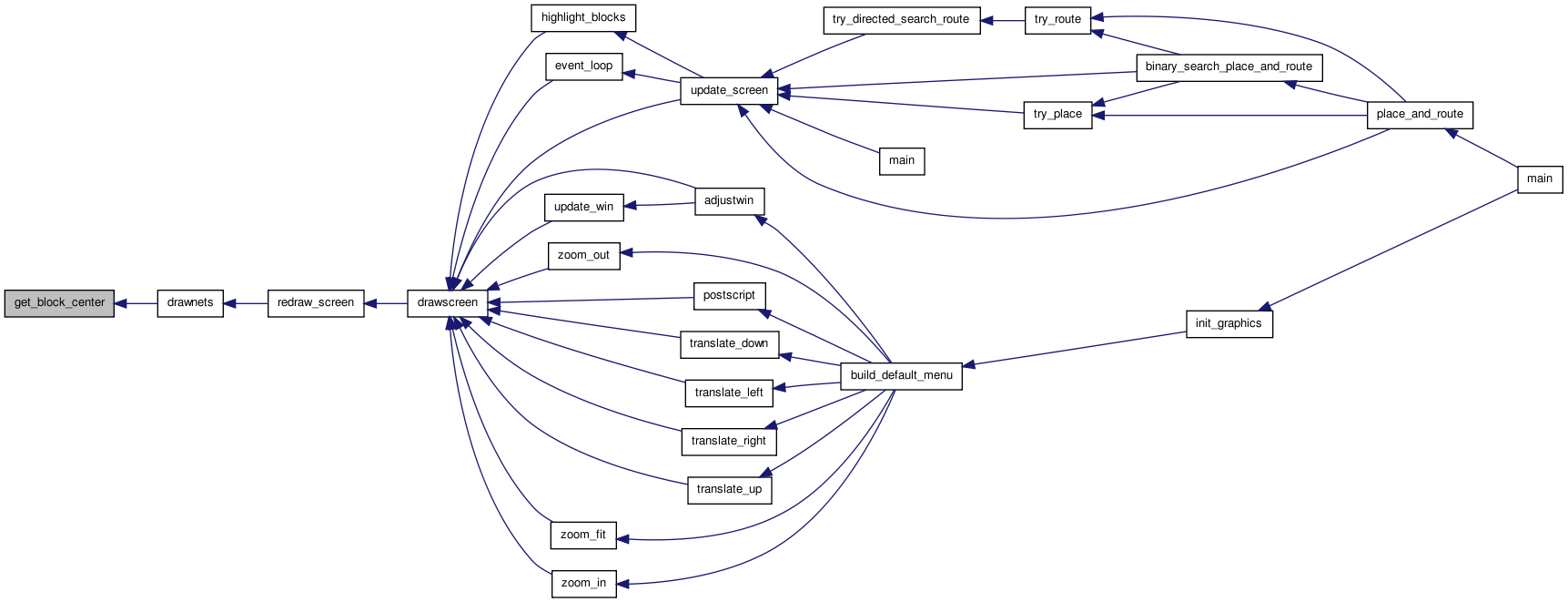
| static void get_rr_pin_draw_coords | ( | int | inode, | |
| int | iside, | |||
| int | ioff, | |||
| float * | xcen, | |||
| float * | ycen | |||
| ) | [static] |
Definition at line 1517 of file draw.c.
01522 { 01523 01524 /* Returns the coordinates at which the center of this pin should be drawn. * 01525 * inode gives the node number, and iside gives the side of the clb or pad * 01526 * the physical pin is on. */ 01527 01528 int i, j, k, ipin, pins_per_sub_tile; 01529 float offset, xc, yc, step; 01530 t_type_ptr type; 01531 01532 i = rr_node[inode].xlow; 01533 j = rr_node[inode].ylow + ioff; /* Need correct tile of block */ 01534 01535 xc = tile_x[i]; 01536 yc = tile_y[j]; 01537 01538 ipin = rr_node[inode].ptc_num; 01539 type = grid[i][j].type; 01540 pins_per_sub_tile = grid[i][j].type->num_pins / grid[i][j].type->capacity; 01541 k = ipin / pins_per_sub_tile; 01542 01543 /* Since pins numbers go across all sub_tiles in a block in order 01544 * we can treat as a block box for this step */ 01545 01546 /* For each sub_tile we need and extra padding space */ 01547 step = (float)(tile_width) / (float)(type->num_pins + type->capacity); 01548 offset = (ipin + k + 1) * step; 01549 01550 switch (iside) 01551 { 01552 case LEFT: 01553 yc += offset; 01554 break; 01555 01556 case RIGHT: 01557 xc += tile_width; 01558 yc += offset; 01559 break; 01560 01561 case BOTTOM: 01562 xc += offset; 01563 break; 01564 01565 case TOP: 01566 xc += offset; 01567 yc += tile_width; 01568 break; 01569 01570 default: 01571 printf("Error in get_rr_pin_draw_coords: Unexpected iside %d.\n", 01572 iside); 01573 exit(1); 01574 break; 01575 } 01576 01577 *xcen = xc; 01578 *ycen = yc; 01579 }

| static int get_track_num | ( | int | inode, | |
| int ** | chanx_track, | |||
| int ** | chany_track | |||
| ) | [static] |
Definition at line 1787 of file draw.c.
01790 { 01791 01792 /* Returns the track number of this routing resource node. */ 01793 01794 int i, j; 01795 t_rr_type rr_type; 01796 01797 if(draw_route_type == DETAILED) 01798 return (rr_node[inode].ptc_num); 01799 01800 /* GLOBAL route stuff below. */ 01801 01802 rr_type = rr_node[inode].type; 01803 i = rr_node[inode].xlow; /* NB: Global rr graphs must have only unit */ 01804 j = rr_node[inode].ylow; /* length channel segments. */ 01805 01806 switch (rr_type) 01807 { 01808 case CHANX: 01809 return (chanx_track[i][j]); 01810 01811 case CHANY: 01812 return (chany_track[i][j]); 01813 01814 default: 01815 printf 01816 ("Error in get_track_num: unexpected node type %d for node %d." 01817 "\n", rr_type, inode); 01818 exit(1); 01819 } 01820 }
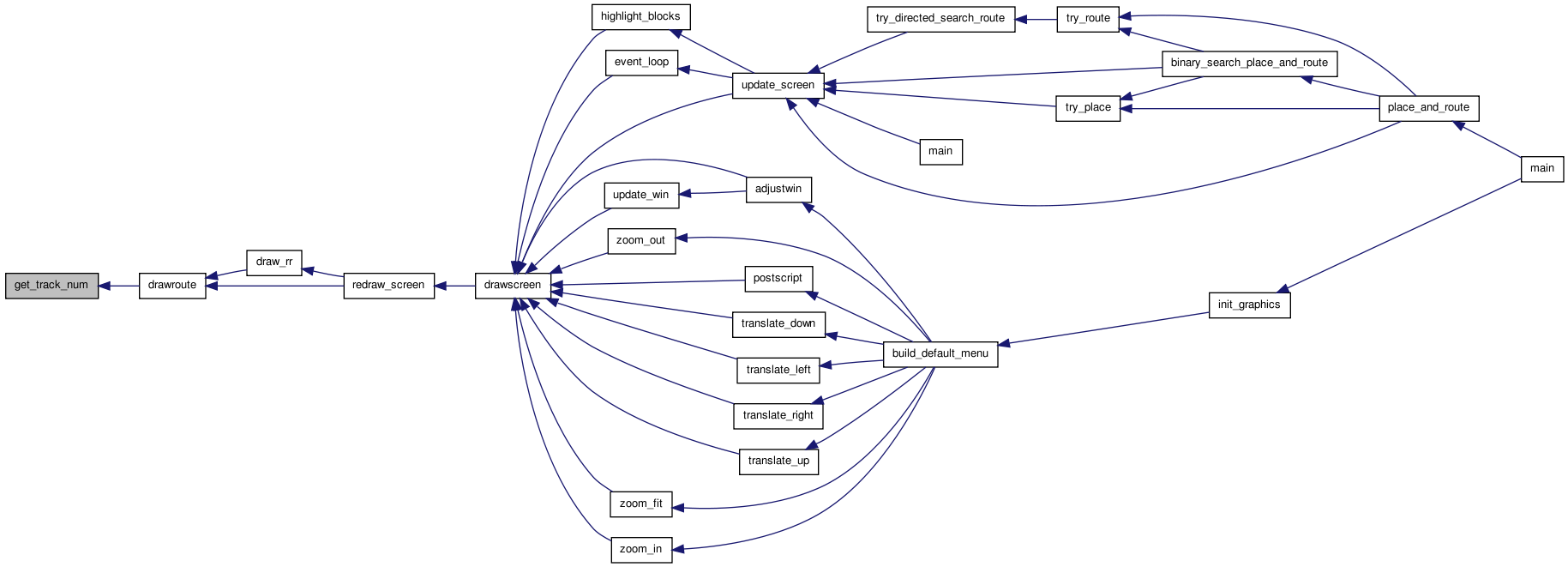
| static void highlight_blocks | ( | float | x, | |
| float | y | |||
| ) | [static] |
Definition at line 1824 of file draw.c.
01826 { 01827 01828 /* This routine is called when the user clicks in the graphics area. * 01829 * It determines if a clb was clicked on. If one was, it is * 01830 * highlighted in green, it's fanin nets and clbs are highlighted in * 01831 * blue and it's fanout is highlighted in red. If no clb was * 01832 * clicked on (user clicked on white space) any old highlighting is * 01833 * removed. Note that even though global nets are not drawn, their * 01834 * fanins and fanouts are highlighted when you click on a block * 01835 * attached to them. */ 01836 01837 int i, j, k, hit, bnum, ipin, netnum, fanblk; 01838 int iclass; 01839 float io_step; 01840 t_type_ptr type; 01841 char msg[BUFSIZE]; 01842 01843 deselect_all(); 01844 01845 hit = 0; 01846 for(i = 0; i <= (nx + 1) && !hit; i++) 01847 { 01848 if(x <= tile_x[i] + tile_width) 01849 { 01850 if(x >= tile_x[i]){ 01851 for(j = 0; j <= (ny + 1) && !hit; j++) 01852 { 01853 if(grid[i][j].offset != 0) 01854 continue; 01855 type = grid[i][j].type; 01856 if(y <= tile_y[j + type->height - 1] + tile_width) 01857 { 01858 if(y >= tile_y[j]) 01859 hit = 1; 01860 } 01861 } 01862 01863 } 01864 } 01865 } 01866 i--; 01867 j--; 01868 01869 if(!hit) 01870 { 01871 update_message(default_message); 01872 drawscreen(); 01873 return; 01874 } 01875 type = grid[i][j].type; 01876 hit = 0; 01877 01878 if(EMPTY_TYPE == type) 01879 { 01880 update_message(default_message); 01881 drawscreen(); 01882 return; 01883 } 01884 01885 /* The user selected the clb at location (i,j). */ 01886 io_step = tile_width / type->capacity; 01887 01888 if((i < 1) || (i > nx)) /* Vertical columns of IOs */ 01889 k = (int)((y - tile_y[j]) / io_step); 01890 else 01891 k = (int)((x - tile_x[i]) / io_step); 01892 01893 assert(k < type->capacity); 01894 if(grid[i][j].blocks[k] == EMPTY) 01895 { 01896 update_message(default_message); 01897 drawscreen(); 01898 return; 01899 } 01900 bnum = grid[i][j].blocks[k]; 01901 01902 /* Highlight fanin and fanout. */ 01903 01904 for(k = 0; k < type->num_pins; k++) 01905 { /* Each pin on a FB */ 01906 netnum = block[bnum].nets[k]; 01907 01908 if(netnum == OPEN) 01909 continue; 01910 01911 iclass = type->pin_class[k]; 01912 01913 if(type->class_inf[iclass].type == DRIVER) 01914 { /* Fanout */ 01915 net_color[netnum] = RED; 01916 for(ipin = 1; ipin <= net[netnum].num_sinks; ipin++) 01917 { 01918 fanblk = net[netnum].node_block[ipin]; 01919 block_color[fanblk] = RED; 01920 } 01921 } 01922 else 01923 { /* This net is fanin to the block. */ 01924 net_color[netnum] = BLUE; 01925 fanblk = net[netnum].node_block[0]; /* DRIVER to net */ 01926 block_color[fanblk] = BLUE; 01927 } 01928 } 01929 01930 block_color[bnum] = GREEN; /* Selected block. */ 01931 01932 sprintf(msg, "Block %d (%s) at (%d, %d) selected.", bnum, 01933 block[bnum].name, i, j); 01934 update_message(msg); 01935 drawscreen(); /* Need to erase screen. */ 01936 }
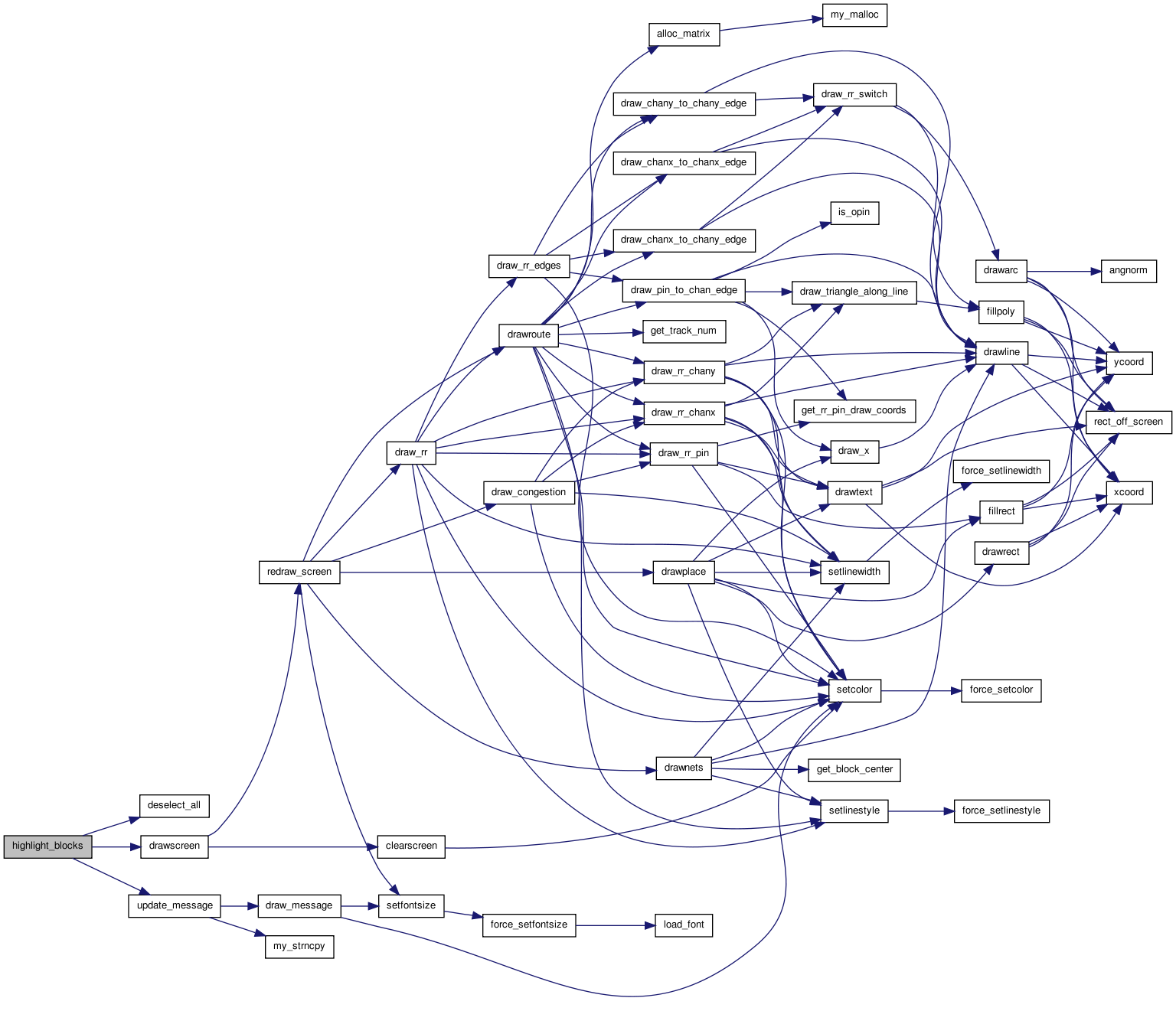

| static void highlight_crit_path | ( | void(*)(void) | drawscreen_ptr | ) | [static] |
Definition at line 376 of file draw.c.
00377 { 00378 00379 /* Highlights all the blocks and nets on the critical path. */ 00380 00381 t_linked_int *critical_path_head, *critical_path_node; 00382 int inode, iblk, inet, num_nets_seen; 00383 static int nets_to_highlight = 1; 00384 char msg[BUFSIZE]; 00385 00386 if(nets_to_highlight == 0) 00387 { /* Clear the display of all highlighting. */ 00388 nets_to_highlight = 1; 00389 deselect_all(); 00390 update_message(default_message); 00391 drawscreen_ptr(); 00392 return; 00393 } 00394 00395 critical_path_head = allocate_and_load_critical_path(); 00396 critical_path_node = critical_path_head; 00397 num_nets_seen = 0; 00398 00399 while(critical_path_node != NULL) 00400 { 00401 inode = critical_path_node->data; 00402 get_tnode_block_and_output_net(inode, &iblk, &inet); 00403 00404 if(num_nets_seen == nets_to_highlight) 00405 { /* Last block */ 00406 block_color[iblk] = MAGENTA; 00407 } 00408 else if(num_nets_seen == nets_to_highlight - 1) 00409 { /* 2nd last block */ 00410 block_color[iblk] = YELLOW; 00411 } 00412 else if(num_nets_seen < nets_to_highlight) 00413 { /* Earlier block */ 00414 block_color[iblk] = DARKGREEN; 00415 } 00416 00417 if(inet != OPEN) 00418 { 00419 num_nets_seen++; 00420 00421 if(num_nets_seen < nets_to_highlight) 00422 { /* First nets. */ 00423 net_color[inet] = DARKGREEN; 00424 } 00425 else if(num_nets_seen == nets_to_highlight) 00426 { 00427 net_color[inet] = CYAN; /* Last (new) net. */ 00428 } 00429 } 00430 00431 critical_path_node = critical_path_node->next; 00432 } 00433 00434 if(nets_to_highlight == num_nets_seen) 00435 { 00436 nets_to_highlight = 0; 00437 sprintf(msg, "All %d nets on the critical path highlighted.", 00438 num_nets_seen); 00439 } 00440 else 00441 { 00442 sprintf(msg, "First %d nets on the critical path highlighted.", 00443 nets_to_highlight); 00444 nets_to_highlight++; 00445 } 00446 00447 free_int_list(&critical_path_head); 00448 00449 update_message(msg); 00450 drawscreen_ptr(); 00451 }


| void init_draw_coords | ( | float | width_val | ) |
Definition at line 475 of file draw.c.
00476 { 00477 00478 /* Load the arrays containing the left and bottom coordinates of the clbs * 00479 * forming the FPGA. tile_width_val sets the width and height of a drawn * 00480 * clb. */ 00481 00482 int i; 00483 int j; 00484 00485 if(!show_graphics) 00486 return; /* -nodisp was selected. */ 00487 00488 tile_width = width_val; 00489 pin_size = 0.3; 00490 for(i = 0; i < num_types; ++i) 00491 { 00492 pin_size = 00493 min(pin_size, 00494 (tile_width / (4.0 * type_descriptors[i].num_pins))); 00495 } 00496 00497 j = 0; 00498 for(i = 0; i < (nx + 1); i++) 00499 { 00500 tile_x[i] = (i * tile_width) + j; 00501 j += chan_width_y[i] + 1; /* N wires need N+1 units of space */ 00502 } 00503 tile_x[nx + 1] = ((nx + 1) * tile_width) + j; 00504 00505 j = 0; 00506 for(i = 0; i < (ny + 1); ++i) 00507 { 00508 tile_y[i] = (i * tile_width) + j; 00509 j += chan_width_x[i] + 1; 00510 } 00511 tile_y[ny + 1] = ((ny + 1) * tile_width) + j; 00512 00513 init_world(0.0, 00514 tile_y[ny + 1] + tile_width, tile_x[nx + 1] + tile_width, 0.0); 00515 }


| static void redraw_screen | ( | void | ) | [static] |
Definition at line 265 of file draw.c.
00266 { 00267 00268 /* The screen redrawing routine called by drawscreen and * 00269 * highlight_blocks. Call this routine instead of drawscreen if * 00270 * you know you don't need to erase the current graphics, and want * 00271 * to avoid a screen "flash". */ 00272 00273 setfontsize(20); /* UDSD Modification by WMF */ 00274 if(pic_on_screen == PLACEMENT) 00275 { 00276 drawplace(); 00277 if(show_nets) 00278 { 00279 drawnets(); 00280 } 00281 } 00282 else 00283 { /* ROUTING on screen */ 00284 drawplace(); 00285 00286 if(show_nets) 00287 { 00288 drawroute(ALL_NETS); 00289 } 00290 else 00291 { 00292 draw_rr(); 00293 } 00294 00295 if(show_congestion) 00296 { 00297 draw_congestion(); 00298 } 00299 } 00300 }
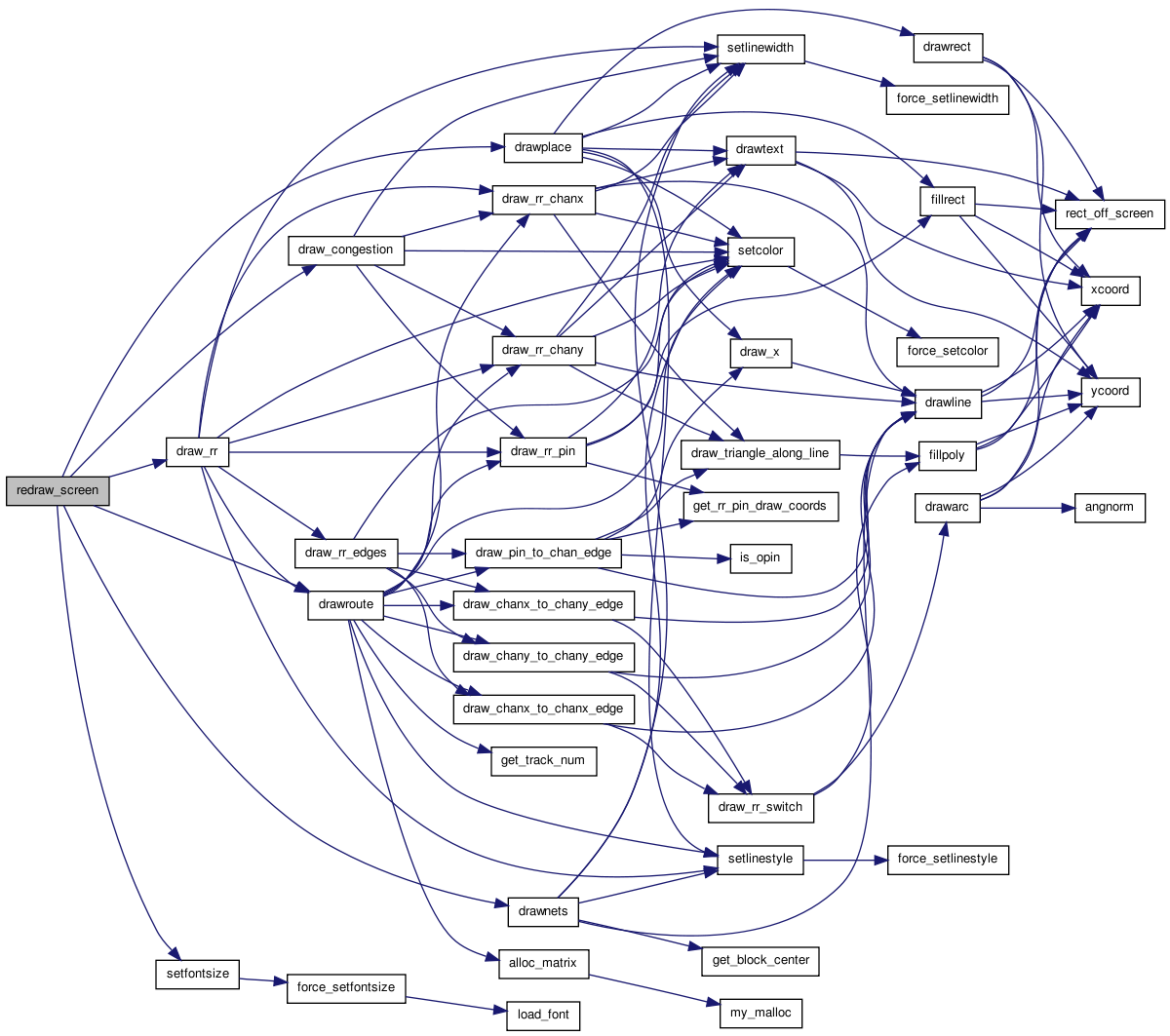
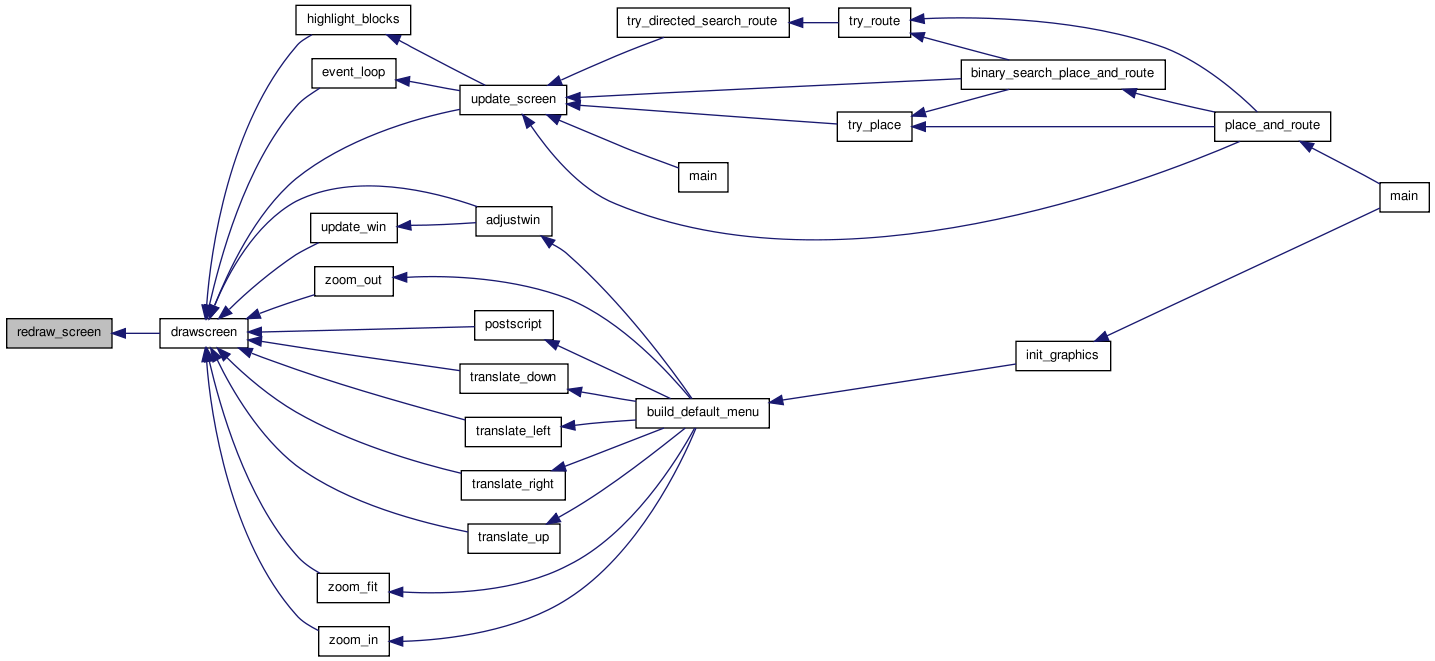
| void set_graphics_state | ( | boolean | show_graphics_val, | |
| int | gr_automode_val, | |||
| enum e_route_type | route_type | |||
| ) |
Definition at line 155 of file draw.c.
00158 { 00159 00160 /* Sets the static show_graphics and gr_automode variables to the * 00161 * desired values. They control if graphics are enabled and, if so, * 00162 * how often the user is prompted for input. */ 00163 00164 show_graphics = show_graphics_val; 00165 gr_automode = gr_automode_val; 00166 draw_route_type = route_type; 00167 }

| static void toggle_congestion | ( | void(*)(void) | drawscreen | ) | [static] |
Definition at line 341 of file draw.c.
00342 { 00343 00344 /* Turns the congestion display on and off. */ 00345 char msg[BUFSIZE]; 00346 int inode, num_congested; 00347 00348 show_nets = FALSE; 00349 draw_rr_toggle = DRAW_NO_RR; 00350 show_congestion = !show_congestion; 00351 00352 if(!show_congestion) 00353 { 00354 update_message(default_message); 00355 } 00356 else 00357 { 00358 num_congested = 0; 00359 for(inode = 0; inode < num_rr_nodes; inode++) 00360 { 00361 if(rr_node[inode].occ > rr_node[inode].capacity) 00362 { 00363 num_congested++; 00364 } 00365 } 00366 00367 sprintf(msg, "%d routing resources are overused.", num_congested); 00368 update_message(msg); 00369 } 00370 00371 drawscreen_ptr(); 00372 }


| static void toggle_nets | ( | void(*)(void) | drawscreen | ) | [static] |
Definition at line 304 of file draw.c.
00305 { 00306 00307 /* Enables/disables drawing of nets when a the user clicks on a button. * 00308 * Also disables drawing of routing resources. See graphics.c for details * 00309 * of how buttons work. */ 00310 00311 show_nets = !show_nets; 00312 draw_rr_toggle = DRAW_NO_RR; 00313 show_congestion = FALSE; 00314 00315 update_message(default_message); 00316 drawscreen_ptr(); 00317 }


| static void toggle_rr | ( | void(*)(void) | drawscreen | ) | [static] |
Definition at line 321 of file draw.c.
00322 { 00323 00324 /* Cycles through the options for viewing the routing resources available * 00325 * in an FPGA. If a routing isn't on screen, the routing graph hasn't been * 00326 * built, and this routine doesn't switch the view. Otherwise, this routine * 00327 * switches to the routing resource view. Clicking on the toggle cycles * 00328 * through the options: DRAW_NO_RR, DRAW_ALL_RR, DRAW_ALL_BUT_BUFFERS_RR, * 00329 * DRAW_NODES_AND_SBOX_RR, and DRAW_NODES_RR. */ 00330 00331 draw_rr_toggle = (draw_rr_toggle + 1) % (DRAW_RR_TOGGLE_MAX); 00332 show_nets = FALSE; 00333 show_congestion = FALSE; 00334 00335 update_message(default_message); 00336 drawscreen_ptr(); 00337 }


| void update_screen | ( | int | priority, | |
| char * | msg, | |||
| enum pic_type | pic_on_screen_val, | |||
| boolean | crit_path_button_enabled | |||
| ) |
Definition at line 171 of file draw.c.
00175 { 00176 00177 /* Updates the screen if the user has requested graphics. The priority * 00178 * value controls whether or not the Proceed button must be clicked to * 00179 * continue. Saves the pic_on_screen_val to allow pan and zoom redraws. */ 00180 00181 if(!show_graphics) /* Graphics turned off */ 00182 return; 00183 00184 00185 00186 /* If it's the type of picture displayed has changed, set up the proper * 00187 * buttons. */ 00188 if(pic_on_screen != pic_on_screen_val) 00189 { 00190 if(pic_on_screen_val == PLACEMENT && pic_on_screen == NO_PICTURE) 00191 { 00192 create_button("Window", "Toggle Nets", toggle_nets); 00193 } 00194 else if(pic_on_screen_val == ROUTING 00195 && pic_on_screen == PLACEMENT) 00196 { 00197 create_button("Toggle Nets", "Toggle RR", toggle_rr); 00198 create_button("Toggle RR", "Congestion", 00199 toggle_congestion); 00200 00201 if(crit_path_button_enabled) 00202 { 00203 create_button("Congestion", "Crit. Path", 00204 highlight_crit_path); 00205 } 00206 } 00207 else if(pic_on_screen_val == PLACEMENT 00208 && pic_on_screen == ROUTING) 00209 { 00210 destroy_button("Toggle RR"); 00211 destroy_button("Congestion"); 00212 00213 if(crit_path_button_enabled) 00214 { 00215 destroy_button("Crit. Path"); 00216 } 00217 } 00218 else if(pic_on_screen_val == ROUTING 00219 && pic_on_screen == NO_PICTURE) 00220 { 00221 create_button("Window", "Toggle Nets", toggle_nets); 00222 create_button("Toggle Nets", "Toggle RR", toggle_rr); 00223 create_button("Toggle RR", "Congestion", 00224 toggle_congestion); 00225 00226 if(crit_path_button_enabled) 00227 { 00228 create_button("Congestion", "Crit. Path", 00229 highlight_crit_path); 00230 } 00231 } 00232 } 00233 /* Save the main message. */ 00234 00235 my_strncpy(default_message, msg, BUFSIZE); 00236 00237 pic_on_screen = pic_on_screen_val; 00238 update_message(msg); 00239 drawscreen(); 00240 if(priority >= gr_automode) 00241 { 00242 event_loop(highlight_blocks, drawscreen); 00243 } 00244 else 00245 { 00246 flushinput(); 00247 } 00248 }
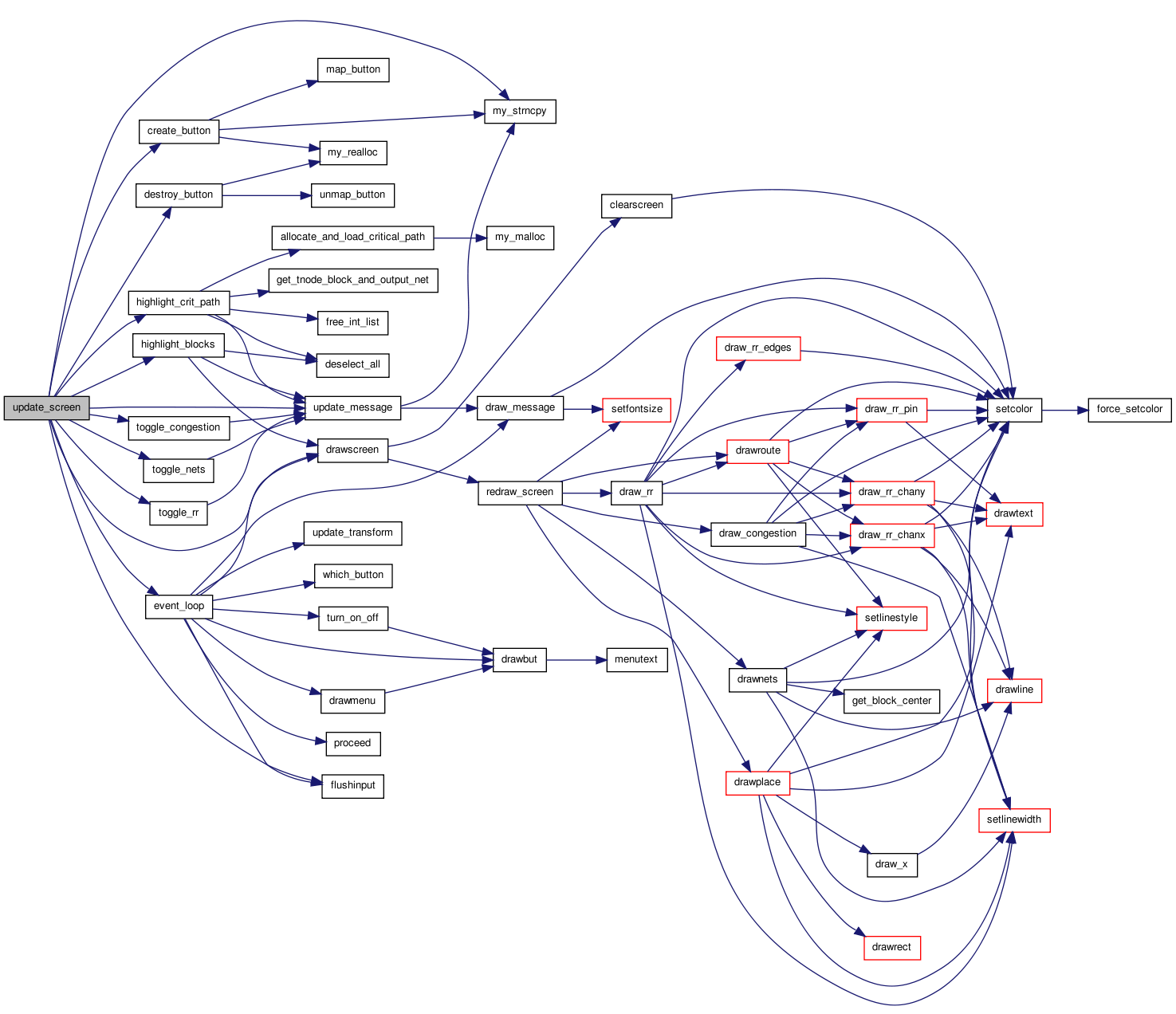

Variable Documentation
char default_message[BUFSIZE] [static] |
enum e_route_type draw_route_type [static] |
enum e_draw_rr_toggle draw_rr_toggle = DRAW_NO_RR [static] |
int gr_automode [static] |
enum pic_type pic_on_screen = NO_PICTURE [static] |
boolean show_congestion = FALSE [static] |
boolean show_graphics [static] |
float tile_width [static] |
 1.6.1
1.6.1